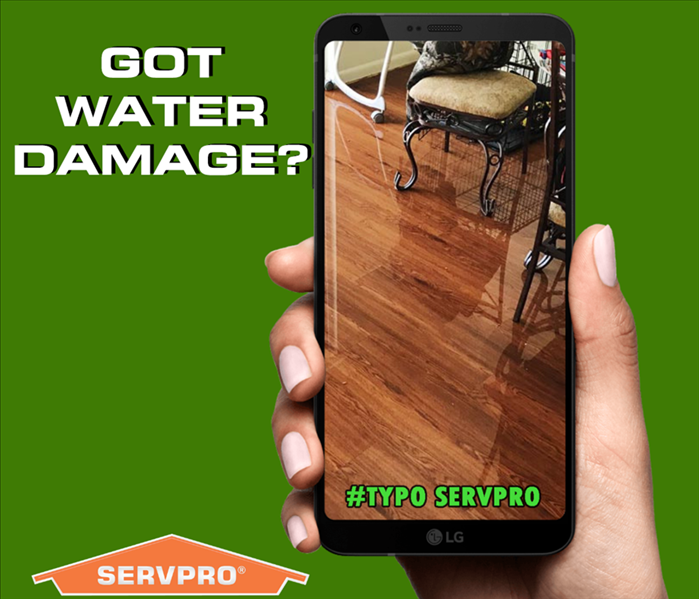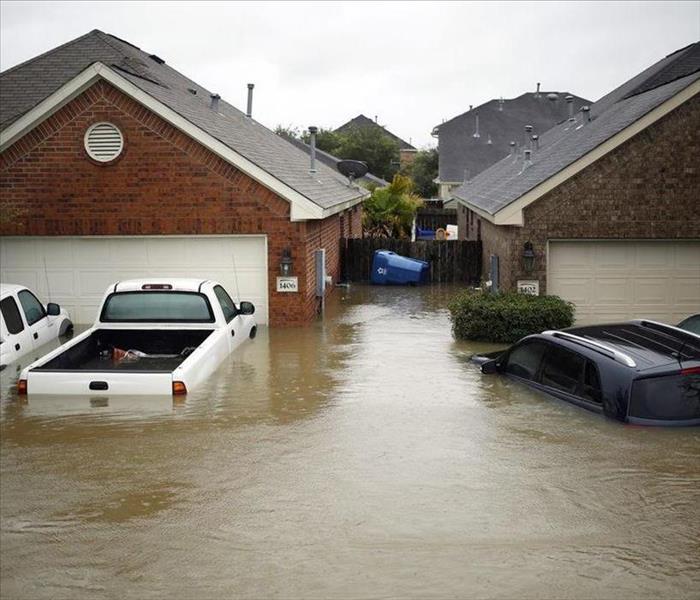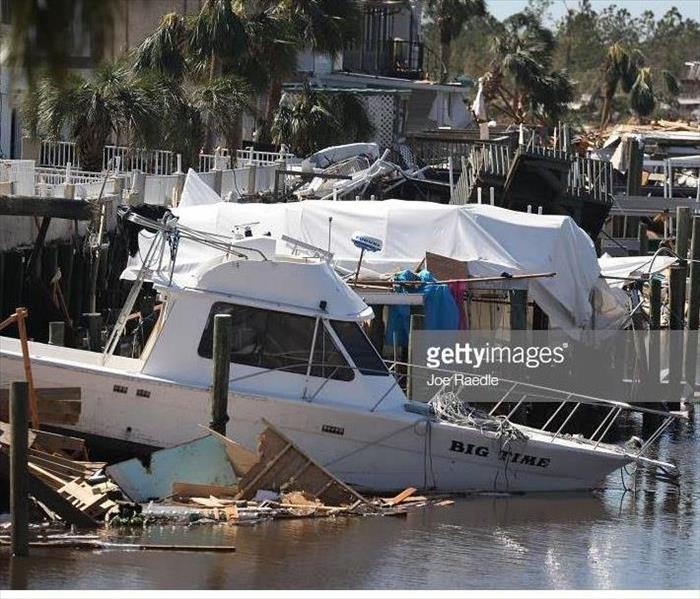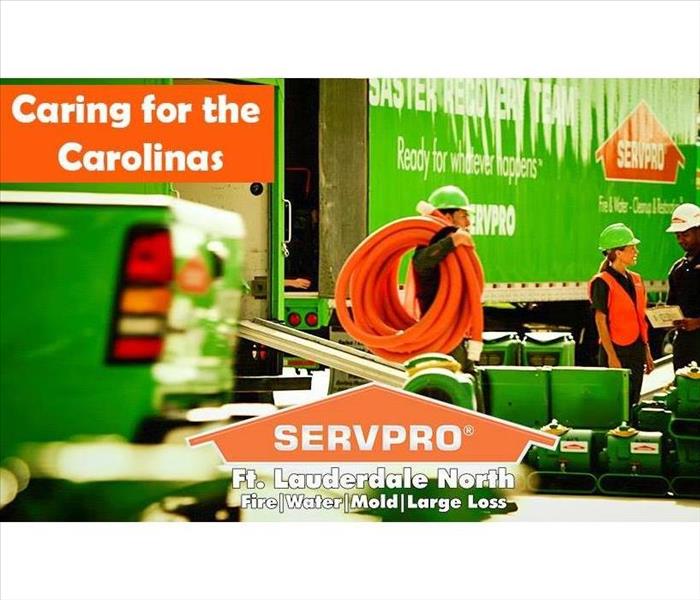Recent Water Damage Posts
Fast Water Removal Prepares Fort Lauderdale Homes for Restoration
6/9/2024 (Permalink)
 If you're in need of water removal services, contact SERVPRO immediately. Our team has the professional equipment to get the job done.
If you're in need of water removal services, contact SERVPRO immediately. Our team has the professional equipment to get the job done.
Water Removal Services Protect Homes & Contents
A water line breaking is a terrible, costly event for any homeowner in Fort Lauderdale. As water sits, it becomes stagnant and murkier, with an increased number of microbes that carry negligible risk when in small numbers. Our SERVPRO® water removal team extracts water with scaled services, including our pump truck. As our largest machine, it powers submersible pumps that extract debris-filled water and smaller extraction wands that fit underneath your kitchen appliances.
The risks of different problems increase, such as contamination and deterioration of building materials within your Fort Lauderdale residence. By initiating water removal services promptly, you can significantly reduce these risks and ensure optimal results after an emergency involving water released into your home's living space, providing you with a sense of relief and reassurance.
Delaying this crucial step allows your house's condition to deteriorate unnecessarily, resulting in several adverse effects:
- Increased humidity,
- Elevated flood-cuts, and
- A reduction in secondary damage.
As water sits, more of it can evaporate into the air. Existing air currents easily carry this moisture to unimpacted areas of your residence.
Water on the floor that reaches the wall then slowly wicks upwards, soaking into the drywall and causing it to expand. Because it is not cost-effective to repair swollen drywall, we opt to make flood cuts and replace the removed material. These are always made above the water line to avoid any sections that may have absorbed water but have not yet exhibited swelling.
Wherever SERVPRO can initiate water removal services soon after an emergency, it plays a crucial role in considerably reducing the structure's risk of secondary water damage and other preventable effects. This ensures that you feel secure and protected, knowing that professionals are taking care of your home.
Call SERVPRO of Ft. Lauderdale North at (954) 733-1006 for water removal services that protect your home and help reduce the overall costs of water damage restoration services.
Professional Help Needed for Fort Lauderdale Water Removal
8/10/2023 (Permalink)
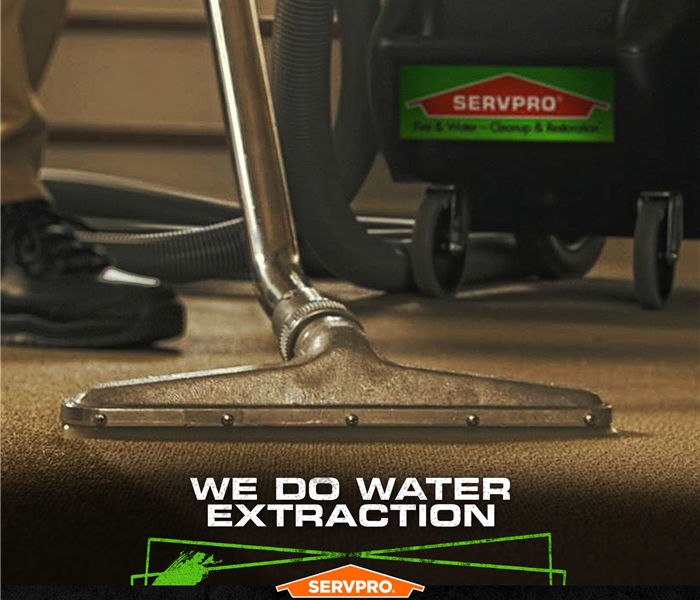 Call SERVPRO of Ft. Lauderdale North for your water disaster emergency. We are Faster to any size disaster™.
Call SERVPRO of Ft. Lauderdale North for your water disaster emergency. We are Faster to any size disaster™.
Fast Fort Lauderdale Water Restoration from SERVPRO®
Fort Lauderdale is famous for its tropical rainforest climate. A relatively cooler and drier season starts in mid-fall. It runs through early spring, ideal for seasonal residents and vacationers looking for a warm and comfortable refuge from snow and cold. The temperature rises, and the risk of precipitation increases in late spring and summer, with showers occasionally approaching monsoon-type intensity. The heaviest rains are most common during May through October. The region receives an average of 60.95 inches of precipitation per year, significantly more than the national average of 30.25 inches.
Disaster restoration companies in South Florida must always prepare for possible severe weather and the damage it can cause. SERVPRO® has the resources to scale its response to catastrophic situations affecting many property owners in the devastated area. As the weather warms and atmospheric shifts begin in May, our (IICRC)-certified crews at SERVPRO guarantee reliable inspection, cleaning, and restoration services and are ready to respond to rainy-season emergency water removal in Ft. Lauderdale North. After extraction and cleaning, we dry out your property for comfort and appearance and to restore function.
A severe and unseasonably early series of rainstorms on April 12, 2023, caught everyone in Fort Lauderdale off guard. In just 12 hours, 25.6 inches of rain fell on the city, more than 40 percent of the annual precipitation. Flash flooding was inevitable as one downpour followed another, a phenomenon known as "training." The relentless rain saturated the ground, causing deep pooling that swamped vehicles and directed runoff into homes and commercial buildings throughout the affected area. The weather pattern produced the rainiest day in the city's history, resulting in the following:
- Fort Lauderdale mayor calling a state of emergency
- School and airport closures
- Drivers abandoning cars
- Greater than 2 million in property damage
- Thankfully no deaths
Our training, experience, and extensive inventory of high-efficiency equipment set us apart, making SERVPRO of Ft. Lauderdale North, a regional leader in water removal. We are just a click away.
Restoration After Fort Lauderdale Water Damage Events
4/17/2023 (Permalink)
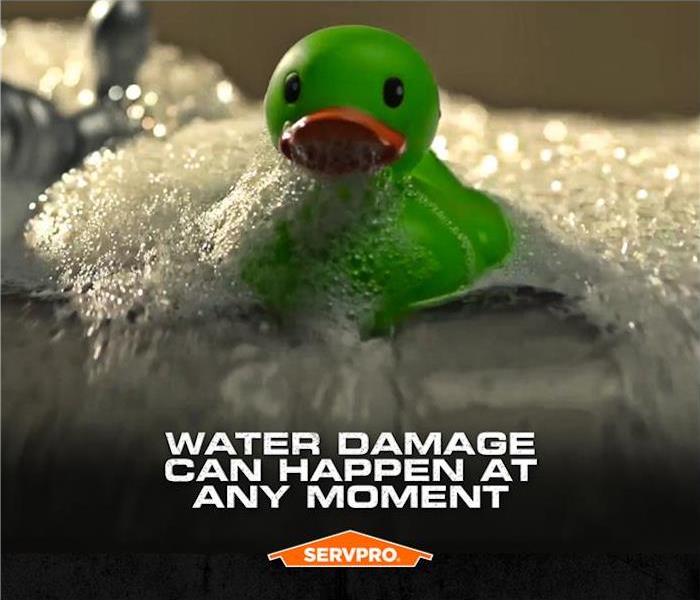 Don't let a water leak make your Fort Lauderdale home into a duck pond! Call SERVPRO for fast removal to mitigate water damage.
Don't let a water leak make your Fort Lauderdale home into a duck pond! Call SERVPRO for fast removal to mitigate water damage.
The Priorities of Water Damage Cleanup
As part of the second largest county in the state, Fort Lauderdale is home to a growing population nearing 200,000. With the frequency of callouts like water disasters and emergencies, the more than a million residents of Broward County rely on SERVPRO to help with critical areas of damage recovery and cleanup like:
- Water removal
- Drying
- Surface cleaning
- Mold prevention
- Deodorization
Fort Lauderdale water damage events require immediate action from experienced professionals on our restoration team. With accreditations from the IICRC in areas like structural drying, water restoration, and microbial remediation, our talented team is ready to help when disasters strike.
Priorities of Water Restoration
Every restoration situation is unique, offering site-specific challenges to return a property to preloss condition as efficiently as possible. Some of the core components of successful mitigation and damage recovery include:
- Extraction
When mitigation gets started for water damage in area homes, one of the key efforts of this process is removing standing water from the flooring. Pooling can spread throughout the house, impacting several flooring materials, wood trim, wall systems, and other sensitive building materials. It should be prioritized to remove any lingering water like this with tools from our stock like:
- Wet Vacuums
- Carpet Wands
- Submersible Pumps
- Thorough Drying
Wet materials require thorough drying to prevent controlled demolition and reconstruction. This effort involves many tools to help regulate moisture and protect sensitive building materials and contents:
- Air Movers - Airflow is one of the primary drying principles, and with axial and centrifugal units in our inventory, we can quickly manage surface water concerns.
- Portable Heaters - Cooler temperatures in the drying areas can slow down productive evaporation, especially by forming invisible barriers several inches above the surface of wet materials. Heaters help to increase the temperature of drying zones to combat this effect.
- Dehumidification Equipment - Regulating moisture content in the environment is also an important step in drying. High humidity slows drying so that dehumidification equipment can collect these moisture grains for removal.
- Special Purpose Drying Tools - However, water damage is not always on the surface for collection and removal. In some situations, special tools like drying mats or weighted extractors must aid in relieving materials of trapped water and moisture.
- Cleaning Impacted Surfaces
Water can leave films and soils on exposed materials, making cleanup a critical step in restoring homes “Like it never even happened.” Most surface cleaning solutions we undertake involve wiping with chemical agents. However, more advanced restoration is often needed for areas like carpeting with our hot water extraction solutions and bonnet cleaning.
- Preventing Mold Damage
It is not a far path from water damage to mold damage, as these microbial colonies need moist environments to develop and thrive. It is a priority for our SERVPRO IICRC-certified team to regulate conditions that could result in microbial threats, often through these three potential actions:
- Potent Products – The first direct line of defense against mold growth are the powerful sporicidal products and antimicrobial solutions that act as inhibitors on treated surfaces.
- Regulating Moisture Concerns – Mold colonies require moist environments to develop and spread. A large part of combatting these harmful scenarios relies on managing this moisture and preventing it from becoming a lingering condition in your household.
- Comprehensive Inspections – We utilize our expertise in microbial remediation to identify developing mold colonies and begin needed removal solutions.
Fort Lauderdale water damage can rapidly impact homes and businesses, creating a harmful situation for property owners. Our SERVPRO of Ft. Lauderdale North team is an experienced unit for water mitigation and restoration solutions. Give us a call to help today at (954) 734-1006.
Effective Water Damage Repair by SERVPRO in Fort Lauderdale
1/10/2023 (Permalink)
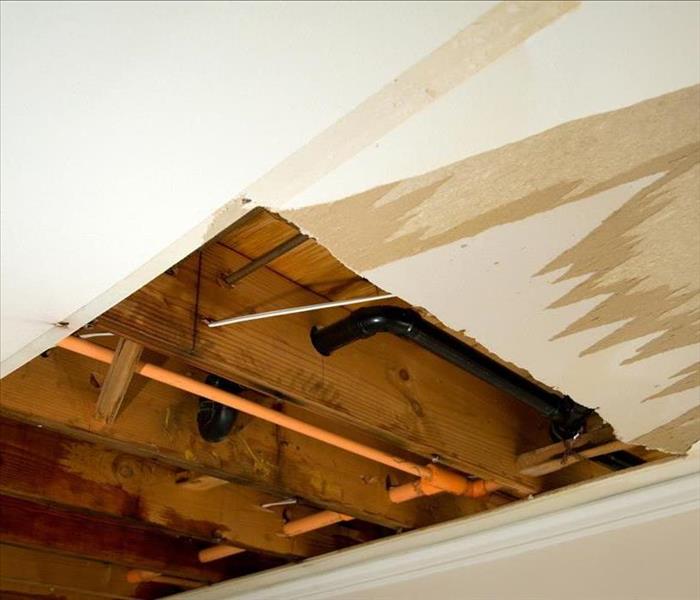 SERVPRO says we repair water damaged drywall in Fort Lauderdale "Like it never even happened."
SERVPRO says we repair water damaged drywall in Fort Lauderdale "Like it never even happened."
Fort Lauderdale Drywall Water Damage Restoration
Water intrusion in your Fort Lauderdale property disrupts normalcy. It can seep into cracks and crevices, soaking into nearby structural materials and belongings where all sorts of problems develop. Drywall is one of the readily affected materials. It would help if you repaired water-damaged drywall as soon as possible, as it can cause even more significant issues, such as mold growth. Depending on where water has intruded and damage accrued, you can partially or entirely replace the drywall.
Homeowners should limit further damage by prioritizing water damage repair in Fort Lauderdale. A water-damaged property poses many hazards which can be dangerous. For example, if wet drywall is due to overhead flooding, the ceiling might collapse, putting your safety at risk. In this case, have your home’s structure evaluated by a professional restoration company, such as SERVPRO. Our teams know how structures are built and inspect the entire assembly to extract moisture successfully.
Other hazards
- Electrical
- Biohazards
- Molds
Safety precautions are essential as some old drywall joint compounds contain asbestos. Also, the electrical system runs through the wall and could cause electrocution when not handled with care.
Drywall moisture removal
To start working on moisture-damaged drywall that requires cutting out some sections, SERVPRO crews clear the area by removing or pulling back items like wet furniture, carpet, and padding. Our crews utilize moisture meters to probe moisture content or level on drywall before deciding how much to cut out. Depending on the damage extent, we may have to remove damaged wall studs, flooring, and cabinets. Once the damaged section is removed and bagged, our crews dry the area around and inside the wall using air movers and dehumidifiers, treat it to remove any odor and prevent microbial growth, then install the new drywall pieces.
Some useful tools when cutting out damaged drywall
- Keyhole saw
- Rotary saw
- Kett saw
- Reciprocating saw
SERVPRO of Ft. Lauderdale North provides quality drywall water damage repair. Call us at (954) 734-1006. We’re Faster To Any Size Disaster.
Water Removal in Wilton Manors Homes Requires SERVPRO’s Assistance
9/12/2022 (Permalink)
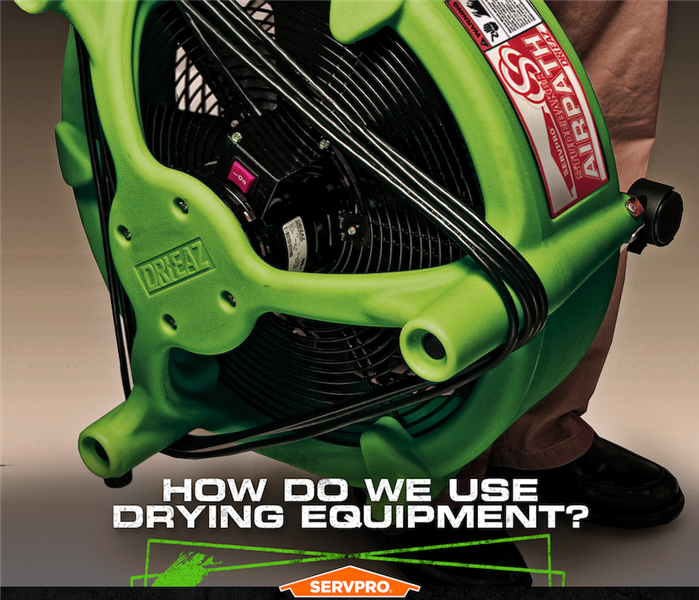 SERVPRO technicians are ready at a moment's notice for all water damage restoration projects. 24/7 365 days a year we are here for you.
SERVPRO technicians are ready at a moment's notice for all water damage restoration projects. 24/7 365 days a year we are here for you.
Get Help with Water Removal in Your Wilton Manors Home
Water emergencies are usually unpredictable, happening when property owners least expect them. No matter what has caused the water intrusion, it can ruin the hardwood floors, carpets, upholstery, appliances, and other items. Saving time is vital to prevent additional and costly damage.
SERVPRO provides professional water removal services in Wilton Manors and can restore your home to a preloss state. Our water removal experts can provide you with the following services:
- A quick assessment of the incident, describe an action plan and offer a cost estimate before restoration work starts.
- Remove standing water.
- Extract water from the carpet and pad.
- Use anti-microbial solutions to treat affected areas.
- Use air moving and dehumidifying equipment to speed up drying.
Assessment
Due to water’s invasive nature, it is crucial to locate the source of the leak and start extraction immediately. Our technicians can use moisture detection tools like infrared cameras to locate areas with high moisture content.
Remove standing water
Our SERVPRO team can use powerful portable pumps to remove the standing water quickly to reduce water damage repair needs. Our training ensures that we know and uphold every industry standard for proper and safe water removal jobs.
Extract water from the carpet and pad
Aggressive water extraction can cause carpet delamination. Carpeting is 50 percent weaker when wet. Heavy equipment can help squeeze out water from the carpet to be extracted. Generally, we use carpet wands to remove water from glue-down carpeting.
Use anti-microbial solutions to treat affected areas
Applying anti-microbial products is one of the effective ways to control microbial growth. These products can control microbes when we use them, along with fast drying.
Use air movers and dehumidifiers to expedite drying.
Our SERVPRO team knows the proper technique for using airflow during the drying process. Air movers enhance evaporation at the surface level and minimize drying time. Dehumidifiers emit dry, hot air that is useful for drying hard-to-dry areas like pillars, walls, and other saturated areas.
After experiencing water damage, call SERVPRO of Ft. Lauderdale North at (954) 734-1006 to handle the problem. We can make the mishap seem “Like it never even happened.”
Thoroughly Drying Ft. Lauderdale Water Damage
8/13/2022 (Permalink)
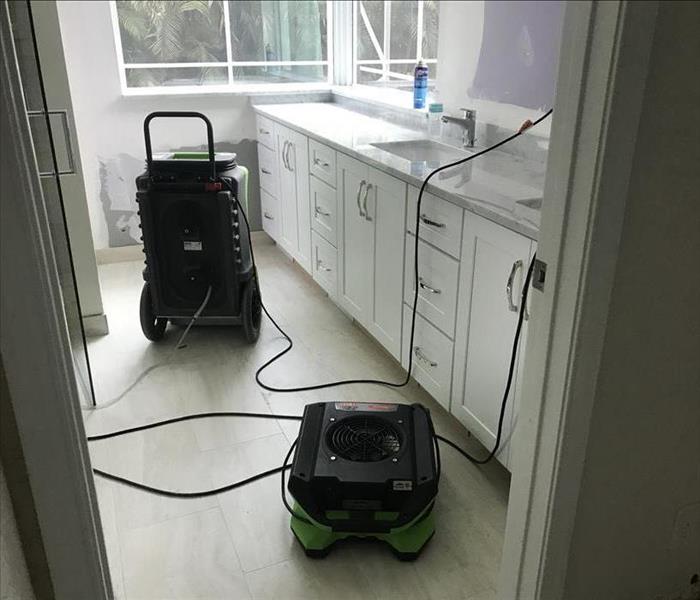 SERVPRO controls water damage with extraction, drying with advanced equipment, and dedication to making our Fort Lauderdale customers happy.
SERVPRO controls water damage with extraction, drying with advanced equipment, and dedication to making our Fort Lauderdale customers happy.
Tools Help Show Water Damage Drying Progress
Drying up the damage in your home after a disaster is a priority of responding technicians. We have talented professionals capable of rapidly assessing the condition of your home and counteracting any troubling circumstances with equipment like air movers, dehumidifiers, and heaters. The objective is to dry the property and prevent thoroughly:
? Damage to the structure
? Unresolved and continued water damage
? Mold spore development
Moisture Migration Concerns
Water damage in Fort Lauderdale homes can spread quickly and indiscriminately, making multiple rooms of your home susceptible to its effects. Migrating moisture must be tracked and documented; specific sensors and products in our inventory can help. With advanced technology like infrared imagery, we can show where moisture caches exist that could require demolition to reach or where further surface drying attention is needed.
Effective Placement of Drying Tools
One of the applications for sensors and probing detectors is to assess the production of drying tools placed throughout the residence. For example, discovering moisture pockets or damp areas would require a more focused drying need in these positions. Probing moisture meters have a clear and concise readout into the wetness of installed building materials and the general effectiveness or impact of placed air movers seeking to evaporate this water.
Moisture in the environment is essential to successful or failing drying practices. SERVPRO professionals must introduce tools that can help regulate these concerns in the air, such as desiccant and low-grain refrigerant dehumidifiers. Thermohygrometers and other moisture sensors can track the room's dehumidification success.
With water damage events that impact homes in the area, professionals like ours must respond quickly. Without thoroughly drying your residence, you could leave it vulnerable to other secondary effects and damage. Give our SERVPRO of Ft. Lauderdale North team a call to help at (954) 734-1006.
What Type Of Water Damage Is Covered By Insurance?
9/5/2020 (Permalink)
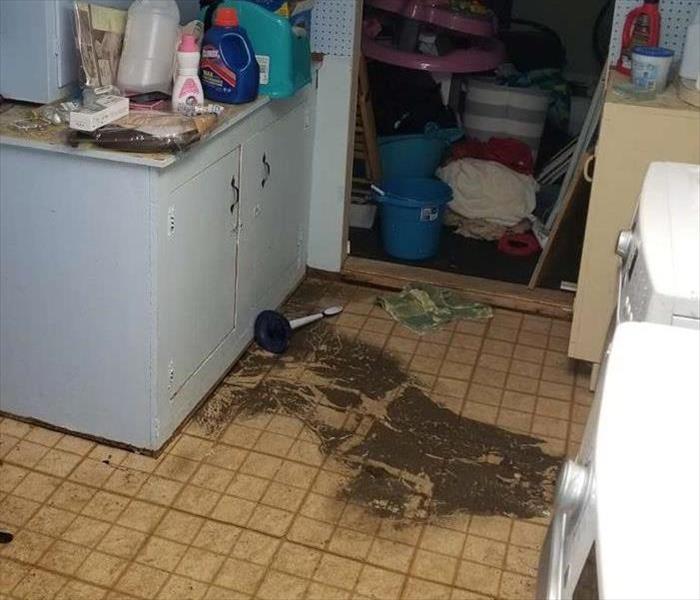 Water damage can also mean dirt and germs...
Water damage can also mean dirt and germs...
Water damage is one of the most common types of homeowner insurance claims, with statistics showing that as recently as 2017, insurance payouts for water damage totaled more than $13 billion. (https://www.insurancebusinessmag.com/us/news/breaking-news/study-water-damage-claims-surging-161741.aspx).
Despite the common occurrence of water damage, many homeowners are unaware of the fact that insurance companies don’t cover every specific type of damage.
In fact, there are certain general rules of thumb that govern what water damage is covered by insurance.
Being aware of these rules before you purchase coverage can help you save money in the long run.
What Is Covered
According to the Insurance Information Institute, most homeowners’ policies cover damage caused by sudden or accidental sources. (https://www.iii.org/article/how-protect-your-home-water-damage).
That can include any of the following:
- Burst pipes caused by cold weather or other unforeseen circumstances.
- Accidental leaks, such as those caused by broken appliances.
- Water damage after a fire, whether it is from the sprinkler system or firefighters’ hoses.
- Water damage from a roof leak caused by accidental means like a tree falling on your roof during a storm.
- Wind-driven damage from storms such as heavy rain or hail.
What Isn’t Covered
- Water damage from neglect or lack of maintenance, including failure to fix plumbing problems, repair roofs, or keep the heat on during freezing temperatures.
- Water damage from intentional acts such as setting fire to your home or intentionally shutting the water off.
- Water damage from earthquakes, landslides or mudslides
- Water damage from floods, hurricanes or tsunamis
- Sewer main backups
- Swimming pool or other structural leaks
- Seepage through the foundation of a home
- Water damage from a sump pump failure
Of course, knowing when is water damage covered by insurance is only half the equation.
Even in cases where water damage may be covered, most homeowner’s policies will not cover the cost of repairing or replacing the cause of the damage, such as buying a new dishwasher or washing machine.
Coverage will only cover mold removal if the water damage was covered by the policy, otherwise, any mold removal or remediation will come out of the homeowner’s pocket.
One of the specific areas people want to know about when asking is water damage covered by insurance is flooding.
While floods can be a major cause of water damage, standard homeowners’ policies do not cover flooding.
For flood protection, you’ll need a secondary policy that can be acquired through FEMA’s National Flood Insurance Program (NFIP)
While asking about water damage is it covered by insurance is only natural, there are certain types of damage that won’t be covered.
Since homeowner’s insurance doesn’t cover damage caused by neglect, it makes good sense to take care of your home so you can protect it from water damage.
Aside from addressing any obvious problems like leaks as soon as you notice them, other steps you can take to prevent water damage include:
- Draining your water heater twice a year to prevent a buildup of sediment.
- Installing smart water leak detectors that will notify you whenever a leak is detected and in some cases even shut off the water automatically to prevent damage.
- Inspect the hoses of all of your appliances such as washing machines and dishwashers to make sure there are no cracks or other signs of wear and replace any worn or damaged hoses.
- Regularly inspect your roof and make any necessary repairs. This may be the most important step you can take to protect your home as the majority of water damage in most homes stems directly from worn or damaged roofs.
- Take steps to ensure that your pipes don’t freeze during winter months. This is particularly important for homes in areas that have harsh winters but it can be effective for any home. Keep your heat set to at least 50 degrees and wrap exposed pipes with some form of insulation.
In many cases, you can help to strengthen your claim by acting quickly to address the cause of water damage and mitigate the effects.
The best way to improve your case is by calling a professional water mitigation company like SERVPRO
The technicians at SERVPRO have extensive training and professional equipment and are guaranteed to respond immediately whenever disaster strikes.
Not only can this help to reduce the growth of hazardous mold and get your home back to normal as quickly as possible, but it can also help to give you peace of mind when it comes to filing your insurance claim and asking what kind of water damage is covered by insurance.
The professionals at SERVPRO are up to date on all of the requirements of the insurance industry and they can help you to be fully prepared when you file your claim so that you can get the best possible result every time.
Knowing what water damage is covered by insurance and having good insurance coverage for water damage can help protect your home against unforeseen problems and when it comes to your home you can’t be too careful.
That’s why you shouldn’t take any chances when disaster strikes and call the water mitigation professionals at SERVPRO to get you and your home on the road to recovery.
Any questions? Just give us a ring (954) 733-1006
What Is Water Damage Insurance And How Much Does It Cost?
8/25/2020 (Permalink)
 Is this enough to call your insurance company?
Is this enough to call your insurance company?
Water damage coverage can be a complicated issue, but it is also one of the most important parts of any homeowners’ insurance policy.
When you consider that every year one in 50 homeowners will file a water damage claim, you can begin to understand why having the best possible coverage is so important.
So while everyone can agree that it is crucial for every homeowner to have some sort of coverage for water damage, the intricate part of the equation is determining exactly what a specific policy covers and how much is water damage insurance.
Costs can vary drastically from one company to another and depending on what specific type of coverage you opt to carry.
So what is water damage coverage on homeowners' insurance?
In general, most homeowners’ policies cover damage that is considered “sudden and accidental”.
This can include burst pipes, accidental leaks, and water damage after a fire. This doesn’t include damage from floods or other natural disasters, however, which will require separate coverage.
Damage that occurs through neglect or from intentional acts like turning your water off for the winter will not be covered.
Even in the case of damage that is covered if your insurance company believes that the damage was made worse because you didn’t act quickly enough to mitigate it, they may refuse to cover it or cut back on the amount they pay out.
According to Forbes, the average cost of a water damage claim is $10,900 (https://www.forbes.com/advisor/homeowners-insurance/water-damage/) and with so many claims being filed each year, it’s easy to see why your insurance company might be hesitant to provide full payment on every claim.
So the more you can do to help your case, the better your chances of getting significant reimbursement
Of course, the amount of your deductible will affect how much you’ll get in return, as that cost will come off the top of your claim.
Also, the type of policy can affect how much you can get in a claim.
Cash value policies only guarantee the current value of your property, taking wear and tear into account, while a Replacement value policy will give you the full amount of a new item.
While specific policy prices can vary from company to company, when asking how much is water damage insurance the answer can depend on certain steps you can take to help reduce your costs.
You should always shop around and never be afraid to ask any relevant questions so that you can compare each company’s prices and know exactly what you’re getting.
In many cases, you can also save yourself money in the long run by raising your deductible. (https://www.iii.org/article/how-to-save-money-on-your-homeowners-insurance)
Since the amount you get from a claim can depend on how quickly you respond when disaster strikes, you can also help to save yourself money by hiring a professional water remediation company like SERVPRO.
Not only can SERVPRO address your water damage thoroughly with our trained professionals and high tech equipment, but we can also help you file your insurance claim so that you can get the best possible result.
Who Should I Call For Water Damage In My Ceiling?
8/23/2020 (Permalink)
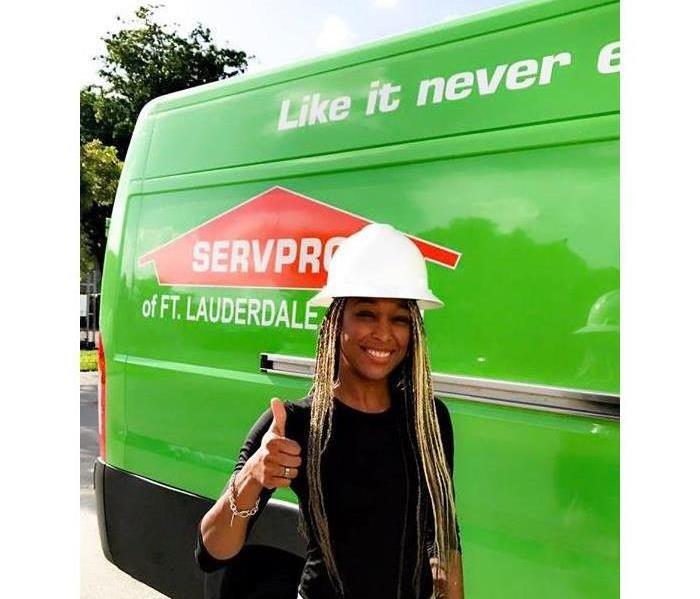 We are here to support you
We are here to support you
Nothing is as troubling as the sight of water leaking from your ceiling.
If you’ve got a leak, or just have discoloration, bubbling or other damage to your ceiling without an active leak, you need to take action before the water damage gets any worse.
When you’ve got water damage who to call can be the most important question of all.
The statistics on water damage are eye-opening. According to the Environmental Protection Agency, leaks in the average household can account for nearly 10,000 gallons of wasted water every year (https://www.epa.gov/watersense/fix-leak-week), so even the most seemingly insignificant leak can eventually add up and knowing when to call water damage professionals can make a huge difference.
So what do you do if you notice a leak or other water damage to your ceiling?
The common instinct for most people is to call their insurance company first.
Obviously, when you have water damage when to call insurance is an important question, but in most cases that shouldn’t be your first consideration.
Even the smallest amount of damage can be serious, as it may signal a much more widespread problem.
For that reason, your first thought when you experience water damage to your ceiling should be to address the underlying cause of the problem as quickly as possible.
The faster you stop the leak or otherwise cut off the water source, the better your chances of mitigating your expenses.
In particular, you need to know who to call for water damage in the ceiling, walls, and floors so that you can begin addressing water damage quickly in order to prevent the growth and spread of mold.
Mold can affect a number of surfaces, including drywall and ceiling tiles, and once it appears it can begin spreading within 24-48 hours.
With this in mind, the EPA suggests that certain actions, including removing and replacing damaged ceiling tiles, should take place within that period. (https://www.epa.gov/sites/production/files/2014-08/documents/table1.pdf)
First Call The Pros
Since mold growth can be a severe health hazard, it is important that any water damage is addressed by a professional remediation company that is equipped to handle the job thoroughly.
Companies like SERVPRO have the training and expertise necessary to identify potential problems and take the proper steps to make sure that they are adequately addressed.
Using specialized equipment such as moisture meters, infrared imaging devices, heavy-duty dehumidifiers, and fans, the professionals at SERVPRO can detect water issues, stop them at the source and thoroughly dry out all surfaces.
They’ll also perform complete mold remediation to ensure that all traces of mold and fungus are removed from your home before they can spread and affect your family’s health.
When To File Your Claim
Insurance coverage for water damage can be a tricky proposition, as not all types of damage are covered by most homeowners’ policies.
You will undoubtedly want to contact your insurance agent once the immediate emergency has been addressed and when you do you should be sure to have all the necessary information at hand to help determine whether your damage is covered and how much money you’ll be able to recover.
Be sure to fully document every step of the process, including taking comprehensive before and after photos and keeping track of all of the bills for repairs and remediation.
The more evidence you can provide for your insurance agent, the better your chances of having a positive outcome for your claim, but it’s not guaranteed.
Most standard homeowners’ policies only cover damage that stems from sudden problems, such as a burst pipe, and they won’t cover damage that results from the gradual wear and tear that occurs over the life of your house.
So if the damage to your ceiling resulted from a worn roof that you failed to maintain, you’ll likely be out of luck.
Don’t Get In Over Your Head
While it can seem overwhelming, when there’s water damage ceiling who to call can be an important factor because having the right response can keep you from ending up in over your head.
The important thing is to take the damage seriously even if it seems minor. While some damage may only require a quick DIY project, more often it is just a signal of more extensive issues beneath the surface and you need to treat the whole thing to keep the damage from building.
When water damage occurs to your ceiling, don’t hesitate to call in the pros
A professional water mitigation company like SERVPRO can keep your water emergency from getting out of hand and help return your home to its original condition so you can breathe easier.
With their extensive knowledge of the industry, they may even be able to help you file your insurance claim to improve your chances of getting positive results.
So don’t let a water damaged ceiling drive you over the edge, rely on SERVPRO to get to the heart of the problem, and prevent mold growth before it can affect your family’s health.
When you have water damage who to call to prevent disaster can be the first step toward restoring your peace of mind.
https://www.SERVPROftlauderdalenorth.com/
(954) 733-1006
We cover all of Fort Lauderdale FL
What Will Water Damage Insurance Cover And How Much Do I Really Need?
8/20/2020 (Permalink)
 We are here to help
We are here to help
There are a number of ways that water can damage your home, including burst pipes, ground seepage, sewage backups, and natural disasters like hurricanes or floods.
Not all instances will be covered by most homeowner’s policies so it’s important to understand what water damage to claim on insurance and what kind of coverage you really need.
When it comes to water damage what will insurance pay for is the first question most people ask
Most homeowner’s policies cover water damage that is sudden and originates inside the home.
This includes scenarios like burst pipes and water damage caused by the fire sprinkler system or by vandalism.
Damage that originates outside the home, such as water seeping in through the foundation or sewage main backups are generally not covered.
The other type of damage that is not covered by a standard homeowner’s policy is what is termed “gradual” damage
This is water damage that results from a lack of regular maintenance.
For instance, if your roof was in a state of disrepair and that lead to a leak, that wouldn’t be covered because you failed to maintain the condition of your roof.
There are additions, called endorsements or riders, that you can make to your standard policy to cover specific kinds of damage not directly covered.
Endorsements address things like mold/fungus and flooding or other natural disasters.
Whether you actually need these riders will depend on the area where you live and whether it is prone to severe weather conditions.
If you have any questions about how much water damage insurance do I need and what type you should get, you should talk with your insurance agent and be sure to ask about what type of policies are offered, what they cover and how much they cost.
Two specific areas that can be particularly challenging for homeowners are mold damage and flooding
You’ll want to pay specific attention to what is and isn’t covered in your home insurance in these areas and figure out when it comes to water damage what to claim on insurance.
Mold/Fungi Damage – In general, mold damage will be included in your home insurance only if it stems directly from a covered loss.
Because mold remediation can be expensive, most insurers will guard against these kinds of claims by either excluding or limiting coverage or raising premiums to cover it. (https://www.naic.org/prod_serv/HMR-ZU-17.pdf)
Flood Damage – Flood damage is not covered by standard homeowner’s policies. In order to cover damage caused by flooding, you’ll need to have a separate flood policy, which can be obtained through FEMA’s National Flood Insurance Program (NFIP).
Flood insurance can be quite costly so it makes sense to determine if you are in an area that is prone to flooding before purchasing it. (https://www.floodsmart.gov/flood-insurance/requirements)
Water damage can be a real headache for homeowners, whether it is covered by your insurance or not
Fortunately, the professionals at SERVPRO have the training, expertise, and equipment to handle any problem big or small and help make your home safe again.
When it comes to water damage, the best thing you can do for your home has the right insurance coverage and call SERVPRO so you know you’re in good hands.
If you have questions?
We are always happy to help.
And we are standing by 24/7/365
Just call (954) 733-1006 and we will help you.
How to Choose The Best Water Mitigation Company in Fort Lauderdale
4/20/2020 (Permalink)
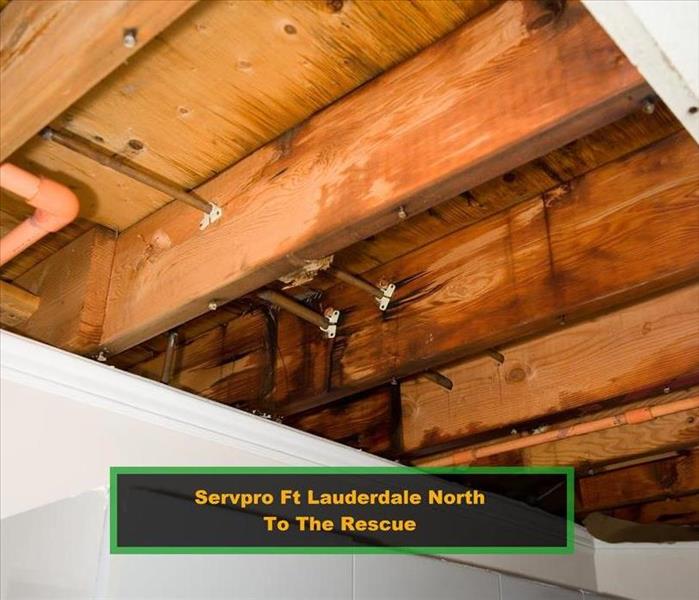 Pipes leaking
Pipes leaking
When water damage strikes, whether, from broken pipes or severe weather, it can be devastating
Not surprisingly, your focus at times like these is to get your home back to normal as quickly as possible.
Hiring a professional, efficient and highly qualified water mitigation company can make all the difference, as they will be prepared to handle your water damage safely and thoroughly.
With the unique weather issues that Florida faces, including heavy rains, hurricanes and king tides, this can be even more crucial.
Fortunately, finding the best water mitigation company in Fort Lauderdale is easy if you know what to look for.
Here are a few qualities that can help you make an informed choice.
A Company That Responds Quickly
The key to mitigating water damage is acting quickly. Since mold begins growing within 48 hours, the faster you begin the cleanup process the better off you’ll be. You should look for a water mitigation company that responds to your emergency and begins the mitigation process immediately.
(https://www.fema.gov/pdf/rebuild/recover/fema_mold_brochure_english.pdf)
SERVPRO understands how important it is to act quickly, which is why we offer 24/7 emergency service.
For more information, please call (954) 733-1006
We are open 24-7
https://www.SERVPROftlauderdalenorth.com/
We know that emergency situations can be distressing and our goal is to help alleviate that stress.
We’ll answer your call immediately, at any time of day, and get a team to your location ready to begin the mitigation process as soon as they arrive.
A Company That is Licensed, Insured and Well-trained
When it comes to your home, you can’t afford to trust just anyone.
You need to be sure that the water mitigation company you hire has the proper licensing, certification and insurance and that their employees are up-to-date on all of the current mitigation techniques.
Don’t be afraid to ask pertinent questions such as how long they’ve been in business and what kind of training they have.
At SERVPRO of Ft. Lauderdale North, our employees undergo regular training in our Corporate Training Facility and get regular certification from organizations such as the IIRC (Institute of Inspection Cleaning and Restoration), NORMI (National Organization of Remediators and Mold Inspectors) and NADCA (National Air Duct Cleaners Association).
We also pride ourselves on using the most current and effective remediation and cleaning techniques.
A Company That Has Good Local References
You need to be sure that the company you hire is reputable and nothing speaks louder than recommendations from satisfied customers.
That’s the advantage to hiring locally; you can easily find references by simply asking your friends and neighbors. You can also, check a company’s rating with the Better Business Bureau (BBB) to determine if they are truly reliable.
SERVPRO of Ft. Lauderdale North is locally owned and operated, so you can be sure that we not only understand the particular needs of the Ft. Lauderdale area but also that we really care about the community because we’re a part of it.
We are accredited by the BBB and have an A+ rating. We were also recognized by the Greater Fort Lauderdale Chamber of Commerce as the 2019 Small Business of the Year in the professional services category.
We will be happy to provide you with reviews from our many satisfied customers so you’ll feel better about trusting us with your home or business.
A Company With A Detailed Plan
Since effective water mitigation means acting quickly, you want to be sure that any company you hire has a detailed plan of attack.
The best water mitigation company will give you an accurate assessment of your damage, and when possible, will try to salvage building materials so that you can avoid costly repairs.
At SERVPRO, our process begins with your initial contact and includes inspection and damage assessment, water removal and extraction, drying and dehumidification and cleaning.
We will monitor your damage, making adjustments to our drying plan, until we have achieved a dry standard. We also realize that every situation is different and we’ll be fully prepared to address your specific needs while employing our general mitigation process.
A Company That Will Help You Navigate the Insurance Process
Dealing with insurance claims can be one of the most difficult parts of any water-related emergency and the best water mitigation company will be aware of that and prepared to help you find your way through the often complex process of filing an insurance claim.
SERVPRO is ready and willing to help you manage the insurance claims process, from accurately documenting the damage to filling out the paperwork.
In times of emergency, you’re under enough stress as it is…we’ll do our best to keep the insurance process from adding to your stress level.
A Company That Uses The Latest Equipment and Techniques
When water damage occurs, it’s important that the extraction, drying and dehumidifying process is handled properly both to correct the immediate problem and to avoid any mold problems in the future.
The best water mitigation company will use state-of-the-art equipment and techniques to make sure that your water damage is repaired and future mold growth is prevented.
The need to stay current is crucial to SERVPRO, which is why we employ state-of-the-art equipment for moisture detection, water extraction, drying, odor removal and sanitizing.
From infrared cameras to locate water, to truck-mounted and portable extraction units and high-speed air movers for thorough drying, we can ensure that every step of your job is handled with the latest technology and the utmost skill and expertise.
A Company That Treats You With Respect
Your home matters to you and when disaster strikes, you want to be sure that it will be treated with the same care and respect that you give it. An emergency is stressful enough; you don’t need a thoughtless water mitigation company making it even harder.
The best water mitigation company will offer the assistance you need, from answering questions to carefully handling your valuable possessions so you can breathe easier.
As members of the local community ourselves, SERVPRO of Ft. Lauderdale North takes great pride in providing the kind of service you expect because we’d want no less for our own homes.
Our goal is to restore your home so that you can’t even tell that water damage ever occurred. We go out of our way, from your initial call to the final step of the mitigation process, to make sure that you always feel cared for in your moment of need.
The Bottom Line
When emergencies strike, you need to be sure that you’ve got the best water mitigation company in Ft. Lauderdale on your side. We've supported hundreds of families and businesses like yours before. You are not alone. Whether reactive or preventative, our team can jump into action to make sure things are a success.
SERVPRO has the expertise, training and service record that you can rely on.
We respond faster to any size disaster and we’ll go the extra mile to give you and your family peace of mind during your “moment of misery.”
For more information, please call (954) 733-1006
We are open 24-7
https://www.SERVPROftlauderdalenorth.com/
Follow our Social media for exclusive tips on dealing with mold, fire or water damage and more: SERVPRO of Ft. Lauderdale North
Facebook
Instagram
Youtube
SERVPRO Repairs Water Damage “Like it never even happened,” in Ft. Lauderdale
3/16/2020 (Permalink)
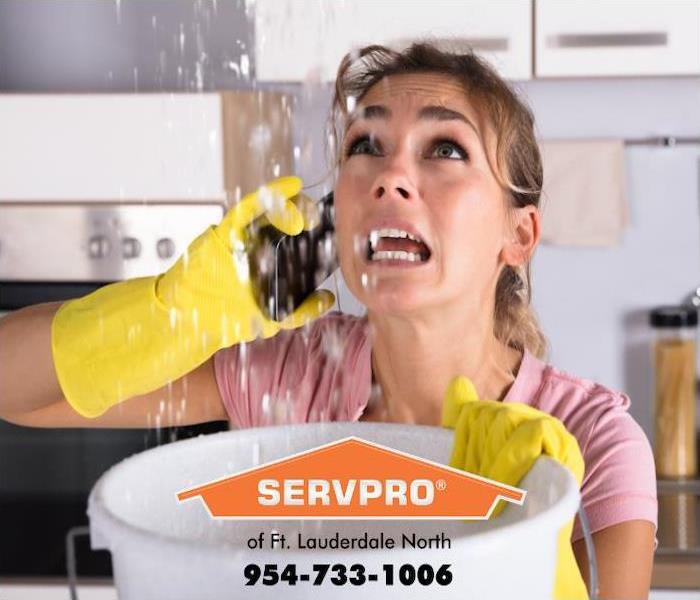 We’re here 24 hours a day to restore water damage in Wilton Manors.
We’re here 24 hours a day to restore water damage in Wilton Manors.
If a water leak causes a flood inside your home do you know what to do? Water damage can occur at any time. A broken pipe, a broken valve or even a broken dishwasher can cause major damage in a short period of time. Sometimes it is not even apparent where the water leak is coming from. SERVPRO® of Ft. Lauderdale North wants the residents of Wilton Manors to know that we are ready to help in the event of water damage to your home or business. With specialized training in water restoration and using state-of-the-art equipment, we will arrive quickly, pinpoint the cause of the damage, and begin the water extraction and mitigation process immediately. We provide the following commercial and residential water cleanup and restoration services:
No matter what your water emergency may be, we are able to respond 24 hours a day, seven days a week. SERVPRO of Ft. Lauderdale North wants commercial business and residential property owners to know that we will clean and restore your water damage in Wilton Manors “Like it never even happened.” Call us today at 954-733-1066.
SERVPRO of Ft. Lauderdale North is independently owned and operated.
Will Insurance Pay for Flood Damage in Ft Lauderdale?
3/15/2020 (Permalink)
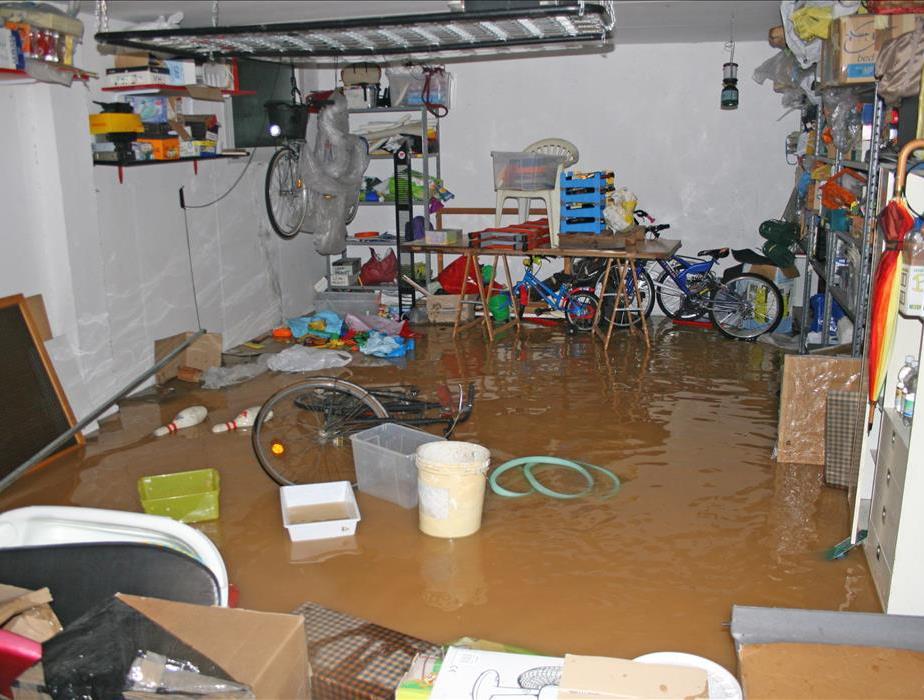 Garages can get flooded too
Garages can get flooded too
Will Insurance Pay for Flood Damage?
Water is one of the main necessities of life and it can be a lifesaver when a fire strikes, but when water suddenly accumulates as the result of a storm or rising tide it can become a powerful foe.
Water damage is one of the most common claims made by homeowners, with 1 in 50 homeowners claiming flood or water damage each year.
It’s no wonder then, that one of the most frequent questions insurance agents get is whether insurance will pay for flood damage. (https://www.wsj.com/articles/american-homeowners-and-their-insurers-face-a-flooding-crisis-from-within-11551960001)
The short answer is that flood damage is generally not covered by most homeowner’s policies.
Of course, there are other ways that water can damage your home and some of them may be covered, which can lead to confusion when making a claim.
In order to more specifically determine what is and isn’t covered it’s first necessary to understand the various types of water damage.
Types of Damage
The three most common types of water damage are sewer or water backup, overflow and discharge, and flooding.
The ability of any of these types of damage to be covered by your insurance may depend on the cause of the damage.
Generally speaking, the damage that results from a sudden or accidental source can be covered and damage that results from long term wear that wasn’t properly addressed likely won’t be covered, but the specifics of your situation may vary.
Sewer or Water Backup –
as the name indicates, sewer backup is when water comes up or is pushed into your home via the sewage or drainage pipes. Sewer backups can be the result of a blocked city main, aging sewer system, tree roots that block a pipe or a backup of the drainage system in your home.
Cleanup from this type of backup can be costly and more often than not, sewer backup is not included in a standard homeowner policy.
Overflow and Discharge Damage –
This is the type of water damage that occurs when pipes burst or a washing machine overflows. It is the most common type of water damage, but the ability to be covered by insurance depends on the cause.
In order to be covered, the cause has to be sudden and accidental rather than maintenance or wear and tear issues.
Flood Damage –
this is the type of damage that occurs when a large amount of water accumulates inside your home in a short amount of time.
Trying to determine whether you have a flood damage claim can be more confusing than you’d think.
There is a distinct difference between general water damage and flood damage and that can make the difference when it comes to your insurance.
The official definition of a flood includes general or partial inundation of two or more acres of land that affects two or more properties that are normally on dry land.
If your home is the only one affected, then you will probably not have a flood claim, no matter how much water you may have.
If the water accumulation in your home was sudden and accidental, however, it could still be covered as a water damage claim.
If other homes have also been affected, then your claim would fall under the definition of a flood. Unfortunately, this means you will likely not have any coverage as most flooding is not covered by home insurance policies.
In order to get reimbursement in these cases, you would need to have supplemental flood insurance, which can be obtained through the National Flood Insurance Program (https://www.floodsmart.gov/faqs).
Flooding can stem from several causes, ranging from sudden storms to melting from heavy snowfall, all of which can be devastating.
Whether it’s a body of water overflowing its banks or a sudden surge from a dam break, the damage can be heavy and costly.
On average, a residential flood claim can be close to $30,000 and that’s just covering the immediate aftermath and not the potential long term effects such as mold buildup.
Some homes are considered high risk because they are located in flood zones, but even for those homes flood damage will not be covered by a standard homeowner’s policy.
For homes that aren’t considered high risk having flood damage covered is more unlikely
In most cases, if your home is considered high risk and you have a mortgage, you will be required to purchase a separate flood insurance policy.
Premiums for this type of policy are based on a variety of factors including the age of your home, the number of floors, the location of contents and the severity of flood risk.
Gradual vs. Sudden Damage
As stated above, only certain types of water damage will be covered by homeowner’s insurance. Damage is generally divided into two basic categories: gradual and sudden.
Gradual damage is usually not covered as it is considered the result of improper maintenance by the homeowner.
Sudden damage, such as that caused by a burst pipe or a sewer backup, maybe covered provided that it only affects your home.
Unfortunately, most gradual damage is not visible to the naked eye, so you likely won’t realize it’s an issue until a problem occurs.
Your house could look perfectly sound on the surface, but beneath those walls, ceilings, and floors there could be issues that may worsen over time if they aren’t adequately addressed.
Common causes of gradual damage include leaking faucets or pipes, seepage from the foundation, deterioration of roof tiles, deteriorating electrical wiring and mold or rot.
While this type of water damage usually isn’t covered, there may be some exceptions.
If, for instance, mold results directly from a covered loss then you may also be covered for mold remediation, but this will depend on your particular insurance company as rules can vary from one company to another.
Flood Insurance
In order to cover damage to your home and belongings caused by floods or rising water, you’ll need to have separate flood insurance.
Most insurance companies will offer flood insurance through the National Flood Insurance Program (NFIP). When you consider that just one inch of water in your home can cause $25,000 or more in damage, you can see why it is so important to have flood coverage.
The NFIP offers two types of flood coverage: Building Property and Personal Property or Contents.
One covers the actual structure and the other helps to cover everything inside your home. The general recommendation is to purchase both types of coverage to insure against all potential damage.
Even with this comprehensive coverage, however, there are still some types of flood-related damage that won’t be covered, including:
- Damage caused by mildew, mold or moisture that could have been avoided with proper maintenance by the homeowner.
- Precious metals, currency and valuable papers like bonds and stock certificates.
- Property and belongings outside of the home, such as trees, swimming pools, and fences.
- Living expenses for temporary housing.
(https://www.allstate.com/home-insurance/flood-insurance-coverage-options.aspx)
There is little doubt that flood damage can be devastating and the last thing you want to be doing in the immediate aftermath of a flood is worrying about whether you have the funds to help repair your home.
Talking to your insurance agent about what coverage you qualify for and making sure you’re covered ahead of time can take a lot of the burden off of you if disaster should strike.
If you do wind up dealing with water damage caused by flooding, it’s important to remember that you may have options for receiving help. Your insurance agent can be a valuable resource, helping you to determine exactly what kind of coverage you have and what kind of resources are available to you.
When it comes down to dealing with mold and mildew caused by flooding, consulting a mold remediation specialist can also be helpful.
These are professionals who are trained to deal with potentially hazardous mold and who are up to date on all of the latest rules and regulations so they can advise you about what steps to take.
Dealing With Insurance Claims
If you do have insurance, getting the most out of your claim can be a tricky prospect, especially in the immediate aftermath of a flood when you’ll be under a lot of stress. You can help yourself when it comes to filing your claim by keeping a few basic steps in mind:
- Call A Disaster Relief Company First – While your immediate inclination may be to call the insurance company, you’ll be much better off if you contact a disaster relief company first. Not only do they know what to do to repair the damage, but they also know how to deal with insurance companies and can be an important advocate, helping to properly document damage and negotiate with your insurance company.
- Move Quickly To Begin The Restoration Process – Because insurance companies will want complete, detailed proof of damage, the sooner you start the process, the better off you’ll be. Plus you’ll want to make immediate repairs, like closing holes in the roof or sealing off broken windows, as quickly as possible to avoid further damage.
- Gather Evidence – when it comes to making insurance claims, the evidence is key. The better your evidence, the higher the likelihood of a positive outcome on your claim. Your disaster relief company can help you to get the pictures and other evidence you need to place your claim.
- Stand Up For Yourself– Remember, your insurance company is looking out for their own best interests and will want to pay out as little as possible, so it’s up to you to make sure that you get the most out of your claim. Don’t be afraid to speak up for yourself. Again, your disaster relief company can be a good advocate, helping to speak up on your behalf and providing photos and other evidence to prove your claim.
- Be Patient – While your focus after a flood or other disaster may be returning back to normal as quickly as possible, unfortunately, the insurance industry doesn’t usually work quickly. Claims can take days or even weeks to be completely processed so you need to be patient and wait it out.
Stay One Step Ahead of Disaster
You can help yourself by being prepared ahead of time. Know the disaster relief companies in your area so you’ll know who to call when disaster strikes.
Review your insurance policy regularly to make sure you know exactly what coverage you’ve got. Finally, be sure to keep good records of all of your belongings and when they were purchased as this can help to expedite your insurance claim.
Your insurance may not cover flood damage but that doesn’t mean you’re on your own.
By taking the right steps now you can maintain peace of mind, whether you’re covered by insurance or not.
Mold cleanup tips here
We service Ft Lauderdale
Water Damage Prevention Tips for Ft. Lauderdale
2/18/2020 (Permalink)
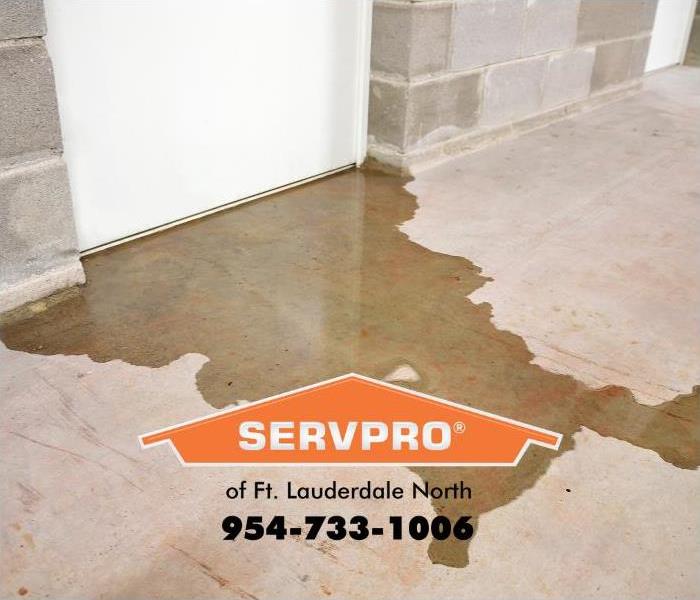 Water damage cleanup services in Sea Ranch Lakes.
Water damage cleanup services in Sea Ranch Lakes.
Did you know that the longer you wait to repair water damage the more expensive the repair becomes? Even waiting one week can increase the cost dramatically. SERVPRO® of Ft. Lauderdale North wants commercial and residential property owners in Sea Ranch Lakes to know that our team of highly trained technicians will respond to your emergency quickly for any size water loss and will begin the extraction process quickly to begin the mitigation process. Once the water is removed, equipment will be placed in the damaged area so building materials can dry as quickly as possible. Here are some tips from the American Red Cross until help arrives:
- From wallboards to rugs, items that are not thoroughly dried can sprout mold and mildew
- Bring all soft items (such as sofas, clothing, bedding, and throw rugs) outside if possible – sunlight and wind will help them dry faster
- Throw out items that have absorbed water and cannot be cleaned or disinfected. This includes mattresses, carpeting, cosmetics, stuffed animals and baby toys.
- Keep the windows open and run fans – or keep them shut and run dehumidifiers – to pull moisture out of wood floors and subfloors, beams, doors, etc.
We are highly trained water damage specialists who will respond to any water damage emergency within 24 hours. SERVPRO of Ft. Lauderdale North provides water cleanup and restoration services to Sea Ranch Lakes business owners and residents “Like it never even happened.” Call us today at 954-733-1066.
SERVPRO of Ft. Lauderdale North is independently owned and operated.
Unclog Gutters to Prevent Davie Florida Water Damage
11/25/2019 (Permalink)
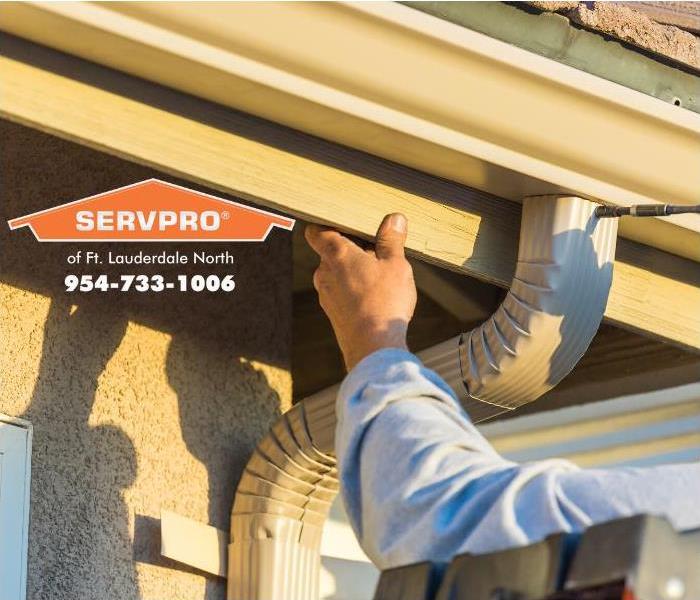 Keeping Your Gutters Clean in Wilton Manor
Keeping Your Gutters Clean in Wilton Manor
Wilton Manor gets plenty of rain. SERVPRO® of Ft. Lauderdale North has no power to change that, but we're sharing information about the importance of cleaning the gutters of your home or office.
Clear Gutters Help Prevent Storm Damage and Water Damage in Wilton Manor:
- Debris such as twigs, leaves, and litter can clog the gutters
- Clogged gutters cannot channel rain to downspouts, leaving the water to run off the side and pool near the building's foundation
- Signs of a possible clog: sagging or off-kilter gutter, nesting birds, water near the building's foundation, leaky roof, rotting foundation
- Clean out the gutters twice a year
- Be sure to check the seams, downspouts, and bends
- Broken struts mean the gutter is more likely to collapse, so replace broken or missing support pieces
- Clogged gutters may worsen storm damage or water damage
- Check for damaged or missing screens, replace if necessary
- Find out if any downspouts lead to underground pipes and check those for clogs or debris
If storm damage or water damage hits Wilton Manor, call SERVPRO of Ft. Lauderdale North. We're available 24/7, and we're Faster to any size disaster.
SERVPRO of Ft. Lauderdale North is independently owned and operated.
Links: https://www.houselogic.com/organize-maintain/diy-repair/how-to-unclog-gutter/
https://www.fema.gov/
Fort Lauderdale Yacht Water Damage Restoration
10/31/2019 (Permalink)
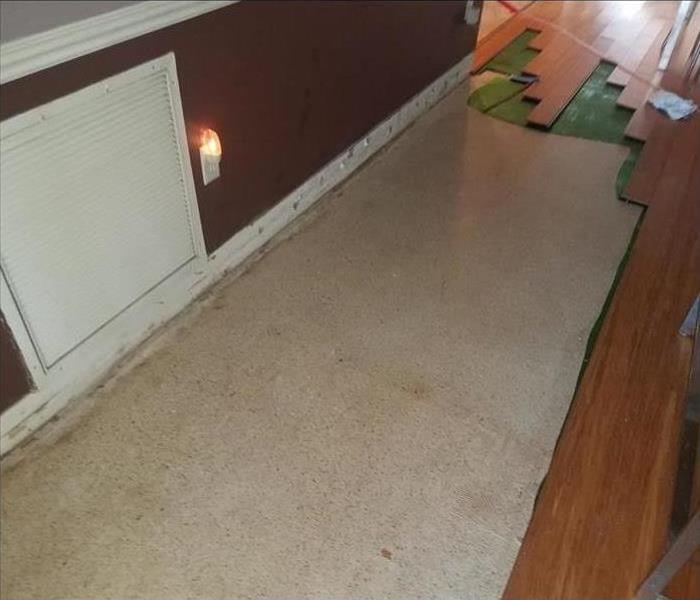 Water Damage on Carpet within a Wilton Manors Yacht
Water Damage on Carpet within a Wilton Manors Yacht
Yacht Water Damage Restoration
Yacht water damage cleanings are just one of the many services we offer. Not many consider the need for this type of cleaning service until something happens in their Yacht that would require cleaning. We’re here to inform you of what to look for and how to prevent it so that you may never need to request our services.
With the Ft. Lauderdale Boat show underway, it’s important that all yacht owners out there know who the professionals are when reaching out for damage restorations services. Owners need to know how to take care of yacht water damage.
Potential Yacht Water damage can be noticed by the following:
- Bubbling of surfaces or in the main structure of a yacht’s interior
- Odor associated with mildew or mold growth even if you cannot see it
- Crusted salt build up on the Yacht’s upholstery
If you believe that water damage has occurred within your yacht, make sure to take the necessary next steps to have the problem fixed at its source. Don’t use appliances or attempt to fix the problem on your own as this may cause more damage in the long run rather than if you let a professional handle it.
Call a professional like those at SERVPRO Ft. Lauderdale North (954) 733-1006. Once you identify and possibly fix the cause of the yacht water intrusion, you can take steps to prevent them in the future.
Water intrusion can include:
- slow leak
- hurricane
- salt spray
- etc.
A SERVPRO team can get started on cleaning any upholstery, decks, walls, and anything else infiltrated by water.
The sooner you get a team to your yacht, the less salt damage will occur. Salt will corrode important seals, joints, and mechanical components if left unfixed for too long. Ocean water and even brackish water, like that in the inter-coastal, are particularly difficult to remediate due to the salt content and should be left to your SERVPRO team.
The Fort Lauderdale Boat show runs from October 30th to November 3rd. For more information click this link.
You've got the support, always here to help.
We've supported hundreds of families and businesses like yours before. You are not alone. Whether reactive or preventative, our team can jump into action to make sure things are a success.
Give SERVPRO of Ft. Lauderdale North a call at (954) 733-1006 or visit our website at http://www.SERVPROftlauderdalenorth.com/
Follow our Social media for exclusive tips on dealing with mold, fires, water damage and more: SERVPRO of Ft. Lauderdale North
Facebook
Instagram
Check out our videos! https://www.SERVPROftlauderdalenorth.com/video-content
King Tides Bring Flood to Fort Lauderdale and the Isles
10/24/2019 (Permalink)
 What do you do after a King Tide Flooding?
What do you do after a King Tide Flooding?
King Tide Floods
King tides are the highest predicted high tides of the year at a coastal location for example in the Rio Vista Isles and even the Las Olas Isles. They occur when the orbits and alignment of the Earth, moon and sun combine with seasonal variations to produce the greatest tidal effect of the year. During king tides, Ft. Lauderdale is vulnerable to flooding in low-lying areas due to its seven miles of beaches, over 200 miles of canal coastline, its flat topography and its shallow, porous aquifer.
King Tides are on the Way
Upcoming dates for king tides in Broward County are November 24 – 28, 2019.
What to do?
There are a number of things you can do to be better prepared for the flooding that may occur during a king tide:
- Relocate electrical panel boxes, A/C units, water heaters and other appliances to elevated locations.
- Remove garbage bins from the street.
- Report or fix any drainage problems around your property.
- Install check vales to prevent floodwater from backing up into drains.
- Consider constructing a flood wall to stop flood water from entering your property.
When King Tides occur, remember the following:
- Avoid walking through flood waters as it is a health hazard and can be dangerous.
- Rise off all your landscaping if is touched or covered by flood water.
- Be sure to follow any road closure or detour signs to avoid driving through flooded streets.
- If you must drive through floodwater during a king tide, take it afterward to a car wash equipped with an undercarriage sprayer to remove saltwater from your vehicle.
The City of Fort Lauderdale will respond to flood inquires 24/7 if you call its 24-Hour Customer Service Center at 954-828-8000. And should flood water enter your home, SERVPRO will provide local emergency response 24/7 when you call 954-733-1006.
Additional Resources
Additional information about king tides can be found on the City of Fort Lauderdale’s website here: http://ow.ly/bN2d50wT0vK
Brizaga, Inc
Brizaga, Inc., a Fort Lauderdale company that specializes in helping property owners and governments prepare for rising sea levels also has a number of resources on their website (www.brizaga.com) including a link to FEMA’s interactive flood zone map as well as information regarding what to consider when constructing a flood wall.
Broward County is looking for citizen scientists to help document local tidal flooding. Clicke here learn more.
You've got the support, always here to help.
We've supported hundreds of families and businesses like yours before. You are not alone. Whether reactive or preventative, our team can jump into action to make sure things are a success.
Give SERVPRO of Ft. Lauderdale North a call at (954) 733-1006 or visit our website at http://www.SERVPROftlauderdalenorth.com/
Follow our Social media for exclusive tips on dealing with mold, fires, water damage and more: SERVPRO of Ft. Lauderdale North
Facebook
Instagram
Roof Tarps can Help Prevent Water Damage in Wilton Manors
10/14/2019 (Permalink)
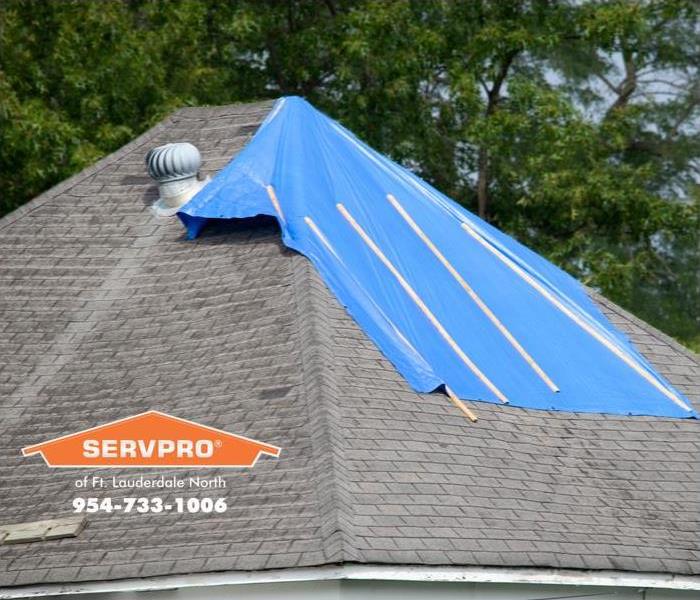 Protecting a damaged roof in Wilton Manors during rainfall can prevent further damage.
Protecting a damaged roof in Wilton Manors during rainfall can prevent further damage.
If you live in the greater Fort Lauderdale area, you know that we might experience almost any kind of weather at any time of the year. With this in mind, there is a chance you could be forced to deal with water damage to your home or office. SERVPRO of Ft. Lauderdale North knows that this can happen without much warning. Something as simple as a small roof leak can lead to massive water damage. Sometimes this is compounded by heavy rainfall and flooding.
SERVPRO of Ft. Lauderdale North is ready to help if you need us, but we also want you to be prepared. If you notice a small roof leak, it is worth it to contact a local roofer to track down the problem. However, in the meantime, if you need some help to tarp your roof to prepare for oncoming storms, give us a call. We can keep that small leak from becoming a big one. Tarps are not good long-term solutions, but they can save you thousands of dollars during storming weather.
After the weather has cleared, we can return to repair both the roof and any damage you experienced from excess water.
Don’t let storms in Wilton Manors get you down.
SERVPRO of Ft. Lauderdale North is “ready for whatever happens.”
Wilton Manors Water Damage: What You Don't See
10/3/2019 (Permalink)
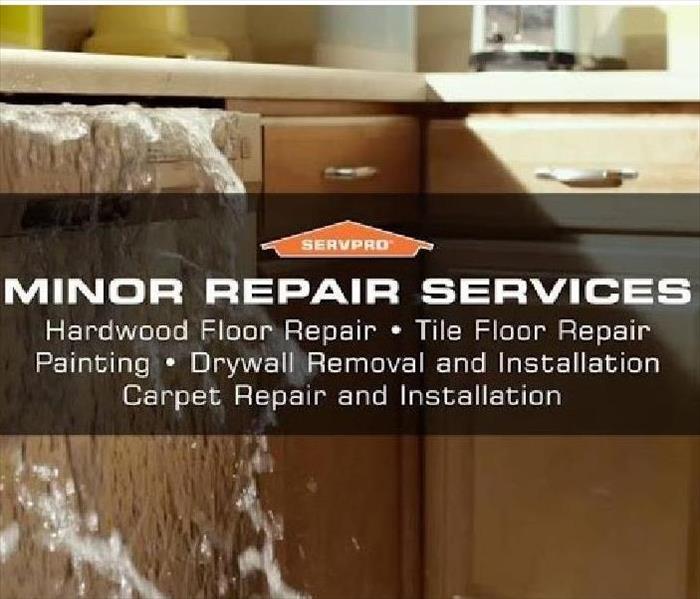 Overflowing Dish Washer water causing Water Damage in Wilton Manors
Overflowing Dish Washer water causing Water Damage in Wilton Manors
Wilton Manors Water Damage can’t always be seen
Whether you can see it or not, water damage can be around you. The problem is, ANY type of water damage can affect the structure of your home or business. Your family or your employee’s health may also be at risk if the water damage turns into a mold problem (another aggressor that you may not always be able to immediately see.)
When trying to avoid the repercussions of letting a water damage issue become costly, its most important to handle the situation from a holistic approach so that it doesn’t become chronic. The only way to truly handle and assess a situation like this is to have the professionals take care of the problem at its source and for those inhabiting the premises to be well educated to make sure issues like this are prevented in the future.
Call your local restoration professionals
SERVPRO of Ft. Lauderdale North is one of your powerful allies to handle the problem. We have the expertise and industry grade equipment to properly coordinate and take care of your water damage situation. We are always there to support our local Fort Lauderdale community and even those outside of the immediate area. If help is needed, feel free to give us a call. To keep educated on these types of issues, feel free to look through our various learning materials which include Water Damage Restoration, Mold Damage Inspections and even Air Duct Cleanings.
Professional Level Water and Mold Damage Support Tools
Technology plays a heavy role in the success of noticing water damage and we use ours to find the issues right at the source. Here are a few:
ULV Foggers (Ultra Low Volume Foggers) – these take liquid detergents and deodorants
Thermohygrometers – These basically measure temperature and humidity in areas. This is very important when it comes to hidden moisture because we can make sure to completely dry the area as well as disinfect and deodorize it. Not always is the water problem simply clean water.
Thermal Fogger – This device allows for us to create a fog that consists of tiny particles of odor removing solution. We tend to use this on fabric and structural areas that may have absorbed fowl odors, but it is especially helpful in hard to reach places.
Moisture Sensors – These sensors come in handy when trying to find the moisture source, hence our title. You can’t fight a battle if you can’t see your enemy, so this device successfully allows us to do just that.
Moisture Meter – Working hand in and hand with the Moisture Sensors, this device allows for us to understand what the moisture if made up of as well as for us to maintain observation of the area as it dries.
Disaster happens. Don't let it get worse before it gets better.
Being Hurricane Ready is the most important skill for a Wilton Manors family. Your hurricane preparation should be complete well before a storm hits. The American Red Cross has an additional hurricane preparation checklist available here. SERVPRO of Ft. Lauderdale North hopes you have a safe and damage-free storm season, but should disaster strike, SERVPRO of Ft. Lauderdale North will arrive "Faster to Any Disaster" and make it "Like it Never Even Happened."
Give us a call at (954) 733-1006 or visit our website at http://www.SERVPROftlauderdalenorth.com/
Follow us on Social media: SERVPRO of Ft. Lauderdale North
Facebook: https://www.facebook.com/SERVPROFtLauderdale/
Instagram: https://www.instagram.com/SERVPROheroftlnorth/
Pompano Beach Water Damage Disaster!
4/1/2019 (Permalink)
Ever find yourself walking into a mess like this?
If you've ever walked into a surprise Pompano Beach water damage situation like this, you know first hand how stressful it can be. You begin to think about how to handle the mess yourself, and you start to dry everything up. But, it is not until you're a few minutes in that you realize that you are in over your head. Even then, beyond what you may be thinking about is the fact that even if you somehow get things in a seemingly dry state, they may not truly be dry - leading to the growth of mold (maybe even under the surface where you cannot see.)
Sound like you?
Now that you're reading this, you're probably swelling with a bit of stress and anxiety because you realize that something like this recently happened and you may have mold growing somewhere you hadn't though to check.
Who do I call? What do I do next? Is it too late, and how far has the damage probably gotten? Listen, stop for a second and take a breath. Everything will be OK. Alright?
That is why SERVPRO exists. So we can take on these stresses so that you don't have to. We see this all the time, and we have the tools, skills, knowledge and experience to get things done right.
If we come to save the day, you can find recreational things to do while you wait here.
SERVPRO of Ft. Lauderdale North Is Here to Help!
We will work with you so that you can have peace of mind while we get things done the right way! Your worst day is usually our daily work and you can give us a call if you have a disaster in the immediate moment, or you may schedule inspections on a routine basis or even just randomly so we can see if you have a worse problem on your hands or if there are minor improvements
Knowing that this is your personal space, we treat your Pompano Beach home, work place, your family and your employees with the utmost respect and consideration. It is important that we make things "like it never even happened."
You've got the support, always here to help.
We've supported hundreds of families and businesses like yours before. You are not alone at any stage of the process, whether reactive or preventative, our team can jump into action to make sure things are a success.
Give us a call at (954) 733-1006 or visit our website at http://www.SERVPROftlauderdalenorth.com/
Follow us on Social media for exclusive tips and tricks to keep your home safe to the dangers of mold, fires, water damage and more: SERVPRO Ft. Lauderdale North
Facebook: https://www.facebook.com/SERVPROFtLauderdale/
Instagram: https://www.instagram.com/SERVPROheroftlnorth/
Different Kinds of Water Damage in Lauderdale
3/18/2019 (Permalink)
Different Kinds of Water Damage Need Different Kinds of Support
Different kinds of water damage can vary based on the degree of contamination in the water. In many Davie Florida and Sunrise Florida homes, you may see these different kinds of water depending on the environment near your home (especially near the Coral Springs Farms or just regular animal owners). Check out what Plantation offers here.
Differentiated by the change and darkness of color, each type of water could cause a different type of property damage. Each type of damage may also require a different intensity of restoration chemicals or equipment and may be damaging to health if exposed to.
Not many people know about the different kinds of water damage
Many usually think of flood caused by a natural disaster or from a nearby water source. While it is usually the case that these different types of water damage can be caused by some nature event of some sort, there are many other ways they can occur. For example:
- House hold appliances may leak, including your fridge, freezer, washing machine, etc
- overflowing sewage or toilets/urinals
- Unattended water sources that overflow like showers, baths or sinks
- Damaged pipes or drainage ports that cause even further issues around the facility
- Compromised shelters allowing outside sources of water to come in
- Natural events that create the destruction of property causing the water damage or water to come in
Different kinds of water can come from different sources, internal or external at times.
But water is water right??
Well not quite. We tend to consider water all the same, but there are definitely different kinds of water and ways to classify them. Each classification has to be treated differently as well.
There are THREE different kinds of water:
- Type 1 – Is the generally safe water. As many consider “clean water” it is not contaminated
- Type 2 – This could also be referred to as “grey Water”, meaning it contains some contamination and would not be sanitary enough for human consumption, this can be because of soap, fat, oil, dust, dirt etc.
- Type 3 – “Black Water”, this is water that is entirely contaminated and usually has disease causing organisms, pathogens, and other dangerous materials. In many cases, black water may contain fecal matter or worse.
Now that you know the different kinds of water
Now you know more about these different kinds of water, you can know how to interact with them or more specifically how NOT to deal with them. Call the restoration professionals who have the proper training and certifications to handle these different types of water damage. We can handle types of dangers so it can be “like it never even happened.”
Give us a call at (954) 733-1006 or visit our website at http://www.SERVPROftlauderdalenorth.com/
Follow us on Social media for exclusive tips and tricks to keep your home safe to the dangers of mold, fires, water damage and more: SERVPRO Ft. Lauderdale North
Facebook: https://www.facebook.com/SERVPROFtLauderdale/
Instagram: https://www.instagram.com/SERVPROheroftlnorth/
SERVPRO Emergency Ready Profile 2018!
12/24/2018 (Permalink)
 Don't hesitate to call the professionals at SERVPRO to handle water damage.
Don't hesitate to call the professionals at SERVPRO to handle water damage.
Is your business ready for disaster? We here at SERVPRO Ft. Lauderdale North have always emphasized how important it is to have disaster plans in place for your home or business, but did you know that we have an app that can make disaster mitigation easier for you and your business? Meet the SERVPRO Emergency Ready Profile! With your ERP in place, you have the disaster advantage of:
- A free assessment of your facility.
- A Profile Document with information that would be critical to quick response in an emergency.
- A guide to prepare you and help you get back in your building faster after a disaster.
- Establishes SERVPRO Ft. Lauderdale North as your disaster mitigation and restoration provider.
- Identification of the line of command at your building/business to begin restoration work ASAP.
- Provides facility details, identifies priority areas, and priority contacts for our team to use.
How to get a SERVPRO Emergency Ready Profile:
- STEP 1: Visit SERVPRO.com/ready. Register for an account using your email address as your username and choose a password.
- STEP 2: Choose SERVPRO Ft. Lauderdale North as your preferred SERVPRO Franchise Representative to contact in the event your home or business experiences water, fire, mold or other type of damage.
- STEP 3: Begin creating ERPs for all of your properties.
- STEP 4: Download the SERVPRO Ready Plan Application on your iPhone, tablet, Android or Blackberry device from the respective App Store.
- STEP 5: Launch the Ready Plan App and sign in using the same username and password from STEP 1.
After that, go through and add information, play around a little and get to know the app before you really need it.
With your SERVPRO Emergency Ready Profile in place, our teams can arrive faster to your disaster. SERVPRO Ft. Lauderdale North can make it "Like it never even happened."
Flood Damage Vs Water Damage: Ft. Lauderdale
12/10/2018 (Permalink)
Flood Damage and Water Damage are different - FEMA
The difference between a water damage and a flood damage is best distinguished by the Federal Emergency Management Agency’s (FEMA) flood definition.
Simply put, the main difference between a flood claim and a water damage claim is where the water comes from. With flood damage, the water comes from a natural source and two or more properties are involved (if you reside in a generally residential versus rural area).
If you and your neighbors are all having water issues due to heavy rains and/or rising waters, then you are likely dealing with a flood damage. For water damage, you may have the water damage issue inside your home, but your neighbor may not. Either source is still a problem of course.
Flood Damage
A flood is defined as a general and temporary condition of partial or complete inundation of two or more acres and two or more properties of normally dry land. Flood damage can only be caused by:
- Overflow of inland or tidal waters
- Unusual and rapid accumulation or runoff of surface waters from any source
- Mudflow
- Collapse of land along the shore of a lake or similar body of water as a result of erosion or undermining caused by waves or currents of water exceeding anticipated cyclical levels that result in a flood as defined above
If the water causing damage in your home is coming from any of these sources, you are probably dealing with flood damage. Click here to see some tips to prevent water damage in the future. Thanks for reading!
No matter what it is considered, call a professional restoration company like SERVPRO to cleanup!
Give us a call at (954) 733-1006 or visit our website at http://www.SERVPROftlauderdalenorth.com/
Follow us on Social media: SERVPRO Ft. Lauderdale North
Facebook: https://www.facebook.com/SERVPROFtLauderdale/
Instagram: https://www.instagram.com/SERVPROheroftlnorth/
Boat & Yacht Water Damage 2018: Hurricane Michael
10/12/2018 (Permalink)
It can happen to anyone.
As we've seen in the major damage of Hurricane Michael this October.
Whether you enjoy cruising the ocean blue, relaxing on sunny weekends, or taking a boating trip every summer, your yacht or boat is important to you, so you need to know how to take care of it and what to look out for that indicates yacht or boat water damage in need of professional attention.
If you suspect your yacht has been water damaged.
Don't turn anything on and don't try to fix or clean anything yourself as this can cause more harm than good. Call a professional like those at SERVPRO Ft. Lauderdale North (or for your local SERVPRO team call 1-800-SERVPRO). Once you identify and possibly fix the cause of the water intrusion- which can include:
- salt spray
- slow leak
- hurricane
- etc.
A few signs of potential water damage include:
- minor blistering or bubbling of surfaces in the structure of the yacht
- excessive mildew odor inside or on deck
- salty buildup on surfaces inside
-a SERVPRO team can get started on cleaning any upholstery, decks, walls, and anything else infiltrated by water.
Ocean water and even brackish water, like that in the intercoastal, are particularly difficult to remediate due to the salt content and should be left to your SERVPRO team. The sooner you get a team to your yacht, the less salt damage will occur. Salt will corrode important seals, joints, and mechanical components if left unfixed for too long.
Call SERVPRO Ft. Lauderdale North for all your yacht cleaning needs. Faster to any yacht water damage disaster SERVPRO Ft. Lauderdale North will make it "Like it never even happened."
Give us a call at (954) 733-1006 or visit our website at http://www.SERVPROftlauderdalenorth.com/
Follow us on Social media: SERVPRO Ft. Lauderdale North
Facebook: https://www.facebook.com/SERVPROFtLauderdale/
Instagram: https://www.instagram.com/SERVPROheroftlnorth/
Hurricane Florence Floods: Caring for the Carolinas
10/1/2018 (Permalink)
Hurricane Florence - "Faster to Any Disaster"
Last month, the largest storm to make landfall in the Carolinas dumped over 2 feet of water on the Carolinas over the course of 3 days. Hurricane Florence rained more in one hour over the city than the area typically gets during the entire month of September. This record amount of rainfall left homes severely damaged or completely washed away.
After the rain stopped, everyone got to work picking up the pieces of their homes and businesses to get things back to normal. During this time, local SERVPRO teams were so over-encumbered they called in other SERVPRO teams from all over the country to aid in clean-up and restoration. SERVPRO Ft. Lauderdale North was one of hundreds of teams who responded to the call.
We loaded up two trucks , an RV, and a few SERVPRO vans and caravaned through to the Carolinas. Over the weeks that followed, we helped many families get their lives back to normal by drying hardwood floors, cleaning carpets, and ripping out soggy drywall.
SERVPRO Ft. Lauderdale North is proud to be part of the Storm Response Team Caring for the Carolinas. Faster to any size disaster, SERVPRO Ft. Lauderdale North will make it "Like it never even happened."
Give us a call at (954) 733-1006 or visit our website at http://www.SERVPROftlauderdalenorth.com/
Follow us on Social media: SERVPRO Ft. Lauderdale North
Facebook: https://www.facebook.com/SERVPROFtLauderdale/
Instagram: https://www.instagram.com/SERVPROheroftlnorth/
Tips to Prevent Water Damage - Pay Attention to Tip 3!
9/24/2018 (Permalink)
Tips to Prevent Water Damage
Most Homeowners insurance policies cover basic water damage claims up to the purchased limit.Preventing the water damage in the first place is a lot easier than going through the claims process! Use these tips to get the best outcome.
Source: Farmer's InsuranceTip 1: Be careful where you plant
Some plants and trees, like weeping willows, have pretty invasive roots. If you’re not careful, they’ll grow right into your sprinkler system, drainage field, pipes, and septic tanks. Plan before you plant to keep roots away from any water lines. It's not everyday that you'd think about this as one of the tips to prevent water damage!
Tip 2: Clean out roof gutters
You know it’s on your to-do list anyway, so if you can, take a safe climb up to your roof next Sunday and check out your gutters. If you’re seeing lots of leaves, birds’ nests, sticks, and whatnot up there, your gutters may not be doing the job you hired them for. And on a rainy day, a clogged gutter can send water spilling into your home’s foundation, through the roof, or down to your basement. That could cause some serious water damage! So next time you’re doing some seasonal cleaning, make sure those gutters are clean. And if your gutters are too high, be safe and get a professional to check them.
Tip 3: Keep an eye on your water bill
This is one of the trickiest of tips on this list. With so many water pipes hidden behind walls and in the floors in your house, you might not know there’s a leak until the damage is done. That’s why it’s a good idea to keep a close eye on your monthly water bill. If you see it starting to creep up, or get one that’s uncommonly high, it’s a pretty good sign that you may have a leak somewhere.
Tip 4: Use a drain snake instead of unclogging chemicals
No matter how crazy clean you are, from your shower to your kitchen sink, clogs are going to happen. And chances are at some point in your life you’ve used one of those powerful chemical drain cleaners to get things moving again. But as convenient as they may be, most folks don’t realize those caustic chemicals are also eating away at their pipes (and they might not be too good for you either). If you rely on them a lot, you could be setting yourself up for leaks. That’s why owning a drain snake is a good solution to clear away clogs. This is one of the less expensive tips, as you can get them at your local hardware store for cheap. Use them to cut through most any clog you’ll have without damaging pipes or making your eyes red and teary.
Tip 5: Never pour grease down your sink
You’ve probably heard this before, but you should definitely avoid pouring grease down your kitchen sink. It doesn’t matter if you flush it with hot or cold water. It can still congeal and cling to your pipes, and could still cause some serious damage and blockage.
Some people use detergent to break up grease before pouring it down the drain…and that may help sometimes. But there’s no guarantee that it’ll keep the grease from sticking to your pipes, so why take the risk?
The safest thing to do is just to pour your grease in an empty can, and either let it sit or put it in the refrigerator. Once it hardens you can toss it in the trash and get rid of it. Done and done.
Give us a call at (954) 733-1006 or visit our website at http://www.SERVPROftlauderdalenorth.com/
Follow us on Social media: SERVPRO Ft. Lauderdale North
Facebook: https://www.facebook.com/SERVPROFtLauderdale/
Instagram: https://www.instagram.com/SERVPROheroftlnorth/
Document Drying with SERVPRO Ft. Lauderdale North
3/12/2018 (Permalink)
 Your personal documents are in good hands with our HIPAA certified document specialists.
Your personal documents are in good hands with our HIPAA certified document specialists.
Our team here at SERVPRO Ft. Lauderdale North understands the importance of your personal records and other documents. Whether it's personal financial records or medical records from a doctor's office, whenever documents are damaged, you can trust SERVPRO Ft. Lauderdale North to handle your document drying for you.
When we come across water damaged documents at a fire or water loss, our SERVPRO Ft. Lauderdale North team's top priority is getting them shipped to our state-of-the-art HIPAA-certified protected document drying facility. This means your files and papers will be immediately frozen, documented, and express-shipped to a secure location. After it arrives, it goes into a low-pressure vaporization chamber that takes the water straight from a solid ice state to a vapor without a harmful liquid state. While your documents can never be the same after water damage, we will do our best to restore them to a usable state. Take a look at our document drying and restoration process:
Step 1) Document Inventory
We barcode every box using the iCat system, allowing us to know the location of any box in our state-of-the-art facility at any time. All Documents are inventoried at the location of the loss prior to packaging and video monitored 24/7 once they arrive- so you know your records are safe.
Step 2) Document Drying
This process involves drying materials frozen by SERVPRO Ft. Lauderdale North using various vacuums and pressurization to achieve sublimation (meaning the ice turns to vapor without getting your documents wet again).
Step 3) Document Decontamination
Gamma Irradiation is a process that is used for cleaning/disinfecting and decontaminating documents or other consumer goods. We use this process to kill any bacteria or other microbes without further damaging important documents.
In a CAT 3 situation (Sewage or Flood water) documents are not only deteriorating but are also infected with all types of bacteria. In most storm situations, we are dealing with CAT 3 water, therefore most of the affected documents will be contaminated; if this is the case than de-contamination is always a must.
Step 4) Document Cleaning
We will go through each box page by page to wipe down and remove dirt, soot, or other contaminants.
We have 3 levels of cleaning based on the type of soiling, and how heavy it is.
Step 5) Document Deodorizing
Many times documents that have been affected will hold residual smells of contaminants, or mildew, and will be deodorized before being returned.
Remember, when it comes to document drying Ft. Lauderdale North is the way to go! SERVPRO Ft. Lauderdale North's certified team is available 24/7/365 for your emergency water damage needs.
Water Class: What Does It Mean?
12/7/2017 (Permalink)
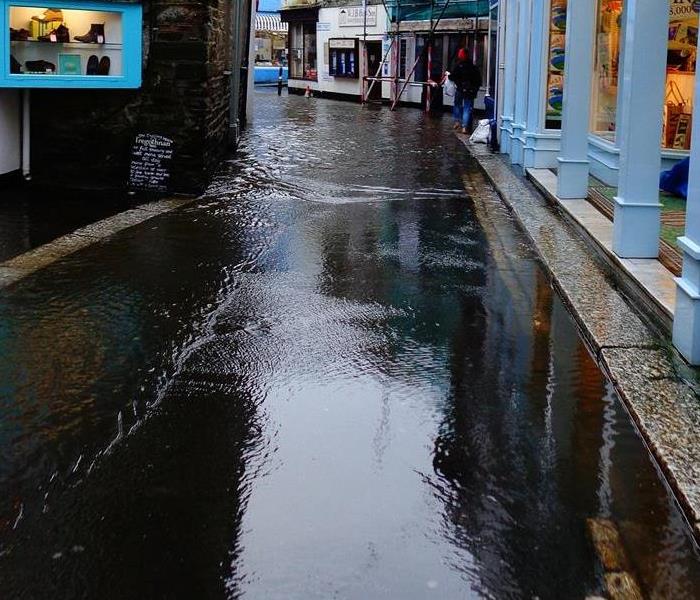 Call SERVPRO 24/7 for emergency service 365 days of the year.
Call SERVPRO 24/7 for emergency service 365 days of the year.
When it comes to water damage restoration, part of SERVPRO Ft. Lauderdale North's assessment process includes categorizing the water loss into four standardized classes. Knowing the water class makes it easier to treat and mitigate a water loss.
Water Class 1
The IICRC defines class 1 water as:
"The lowest and easiest to deal with, this has a slow evaporation rate. Only part of a room or area was affected, there is little or no wet carpet, and the moisture has only affected materials with a low permeance rate, such as plywood or concrete."
What this means is that the water loss is minimal and has not been sitting for long enough to seep into dense or high permeance materials.
Water Class 2
Class 2 water is a little more difficult. IICRC defines it as the following:
"With a fast evaporation rate, this level affects an entire room, carpeting, or cushioning, the wetness has wicked up the walls at least 12, and there is moisture remaining in structural materials."
This means that the water damage had affected an entire area of a building such as a hallway.
Water Class 3
One of the more difficult water loss situations to mitigate is a class 3.
"This class has the fastest evaporation rate, and ceilings, walls, insulation, carpet and sub-floors are all saturated. The liquid may have come from overhead."
This means an entire room has been affected by water damage.
Water Class 4
Class four water is the hardest to treat due to it usually being trapped water.
"This class is labeled as specialty drying situations, which means there has been enough liquid and time to saturate materials with very low permeance, such as hardwood, brick, or stone."
For more info on water damage, visit the IICRC here. And for faster service to any size disaster, call SERVPRO Ft. Lauderdale North for 24/7 emergency service and make it "Like it never even happened."
Water Damage? Here's What You Need To Do
12/1/2017 (Permalink)
 Water damage? Better call SERVPRO!
Water damage? Better call SERVPRO!
So you found some water damage in your home or business and don't know what to do next. SERVPRO Ft. Lauderdale North is here to help!
Step one: Identify and fix the source of the water
Has it been raining a lot lately and flooded your kitchen? Did the storefront next door have a pipe burst? Identify the cause of the water loss, and do your best to remedy the issue. If water is still coming in to the area, there's little our teams can do until the problem is fixed- even if it just means shutting off the water main.
Step two: Call SERVPRO of course!
Don't forget to call your friendly neighborhood SERVPRO! We have an emergency response team available 24/7, any day of the year. If you suffer from water damage, don't wait to call us. Letting water sit can breed hazardous mold and other harmful germs. In fact, mold can form in as little as three days! If you are unsure how long the water has been sitting, you may want to have a third-party mold test done. The point of this test is to see whether or not mold is present so our professional technicians can treat the issue accordingly.
Step three: You can help
If you don't want to wait for our team to arrive, you can start the cleanup by mopping up water and setting out fans in the area affected by the water loss to start the drying process. We'll take over with our professional equipment when we get there.
No one likes being in a water loss situation, but it doesn't need to be a nightmare. SERVPRO Ft. Lauderdale North has the best crew of experienced and certified professional technicians available to make your water loss situation "Like it never even happened."
Yacht Water Damage: Can It Happen To You?
10/10/2017 (Permalink)
 Your yacht is important to you- always be on the lookout for water damage.
Your yacht is important to you- always be on the lookout for water damage.
Whether you enjoy cruising the ocean blue, relaxing on sunny weekends, or taking a boating trip every summer, your yacht is important to you, so you need to know how to take care of it and what to look out for that indicates yacht water damage in need of professional attention.
A few signs of potential yacht water damage include:
- minor blistering or bubbling of surfaces in the structure of the yacht
- excessive mildew odor inside or on deck
- salty buildup on surfaces inside
If you suspect your yacht has been water damaged, don't turn anything on and don't try to fix or clean anything yourself as this can cause more harm than good. Call a professional like those at SERVPRO Ft. Lauderdale North (or for your local SERVPRO team call 1-800-SERVPRO). Once you identify and possibly fix the cause of the water intrusion- which can include:
- salt spray
- slow leak
- hurricane
- etc.
-a SERVPRO team can get started on cleaning any upholstery, decks, walls, and anything else infiltrated by water.
Ocean water and even brackish water, like that in the intercoastal, are particularly difficult to remediate due to the salt content and should be left to your SERVPRO team. The sooner you get a team to your yacht, the less salt damage will occur. Salt will corrode important seals, joints, and mechanical components if left unfixed for too long.
Call SERVPRO Ft. Lauderdale North for all your yacht cleaning needs. Faster to any yacht water damage disaster SERVPRO Ft. Lauderdale North will make it "Like it never even happened."
Water Loss Restoration Equipment
9/26/2017 (Permalink)
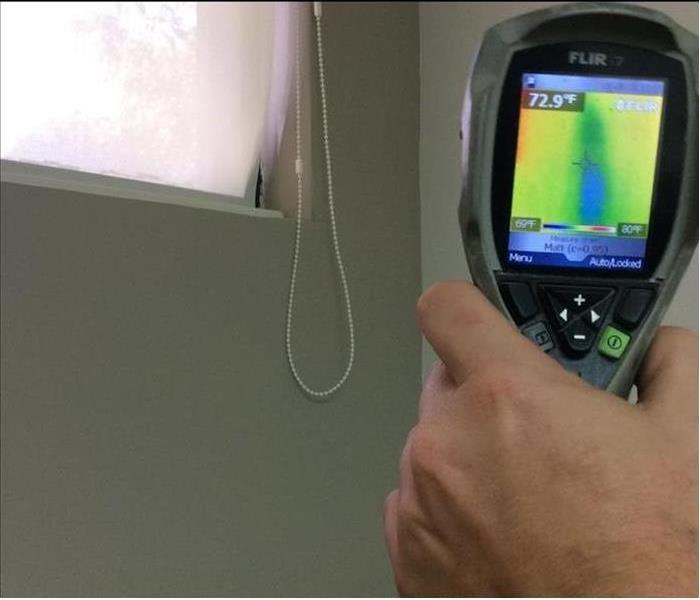 This infrared camera shows us the water in the wall (indicated by blue).
This infrared camera shows us the water in the wall (indicated by blue).
When water damage threatens your property, it's important to call in a restoration company like SERVPRO Ft. Lauderdale North to mitigate the water right away, so no secondary damages occur. Since some water can be contaminated (such as flood waters or sewage leaks), do not try to clean it yourself. The professionals at SERVPRO Ft. Lauderdale North are highly qualified, and armed with the water loss restoration equipment and the know-how to deal with any size water loss situation.
Water detection devices
- moisture sensors and moisture meters- detect the presence of water, and measure the moisture content (how much water is in it), respectively.
- thermo-hygrometers- measures both temperature and humidity. This knowledge helps them set up the right kind of equipment to extract the moisture from furniture, flooring, etc.
- infrared cameras- allow technicians to identify water in the walls that might otherwise be undetectable.
Cleaning and restoration equipment
- extractors- either truck-mounted or portable, this equipment is for cleaning carpet and upholstery, as well as for removing moisture from floors after water loss.
- dehumidifiers- suck moisture in from the air and condense it (it'll be drained into a bucket or directly into a sink or bath tub) the machine pumps back out dry, warm air, allowing the area to dry faster.
- foggers- atomizes deodorizing agents into a mist or fog that can penetrate and help clean hard-to-reach places like the inside of walls.
Click here for more information on our water restoration services, or click here to view water loss before and after pictures. And remember, faster to any size disaster, SERVPRO Ft. Lauderdale North will make it "like it never even happened."
Flood Preparation and What it Means for You
9/12/2017 (Permalink)
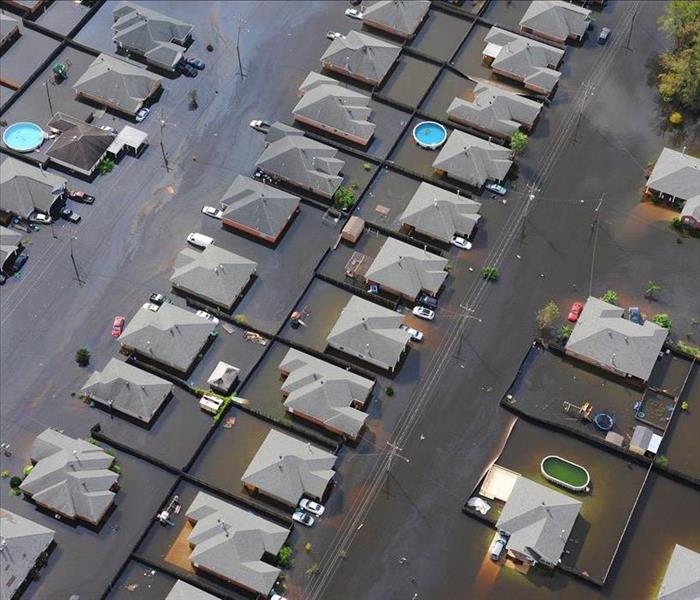 According to NOAA, flooding is a daily threat from coast to coast in the US.
According to NOAA, flooding is a daily threat from coast to coast in the US.
Flooding and flash floods can happen anywhere and to anyone. You may not think you're at risk for flood damage, but even the highest and driest of places can be at risk, so it's important to have a flood preparation plan. But first, let's take a closer look at flooding and why it happens:
Causes of flooding-
Sometimes flooding can move in with very little warning and very quickly, we call this manner of flooding "flash flooding." Both kinds of floods can be caused by:
- rains/storms
- spring thaw/snow melting
- seasonal flooding
- dams or levy's breaking
- tide/storm surge
- river's over-flowing
NOAA has more information on floods and flood safety on their website.
How to build a flood preparation plan-
Know your area. Someone in the middle of the country won't have to worry about storm surge, but may be more at risk for their rivers overflowing with the spring thaw. If you are given the opportunity (in the case of severe storms or hurricanes, and other predictable phenomenon), evacuate your property. Make sure any important documents are secured in a flood proof safe. Be informed about your insurance plan- most don't cover flooding. If you feel you may need flood coverage, alter your plan before disaster strikes.
Flood preparation includes having a plan for after the fact. Know who to call for insurance purposes. Do you own the property, or do you rent? Do you have renter's insurance for your belongings? These are all questions you should keep into consideration while making your plan.
Flood waters are often category 3, also known as "black" water. This water can look safe and clean, but harbors dangerous pathogens and should be avoided, if possible. Never try to clean up water damaged property by yourself. Call in professionals like those at SERVPRO Ft. Lauderdale North to handle the cleanup for you.
 If you're in need of water removal services, contact SERVPRO immediately. Our team has the professional equipment to get the job done.
If you're in need of water removal services, contact SERVPRO immediately. Our team has the professional equipment to get the job done.

 24/7 Emergency Service
24/7 Emergency Service


















